- Immigration Consultants
- Citizenship by Investment
- Study Abroad
- Seminar in Qatar on 27 Jan 2022

Book A Consultation
- Our Vision & Mission
- Express Entry Program
- Alberta PNP
- British Columbia PNP
- New Brunswick PNP
- Nova Scotia PNP
- Manitoba PNP
- Ontario PNP
- Prince Edward Island PNP
- Saskatchewan PNP
- Temporary Work Visa 482
- Temporary Graduate Visa 485
- Spouse Dependent Visa
- Global Talent Visa 858
- Skilled Independent 189
- skilled nominated 190
- Skilled Work Regional Provisional 491
- Work Visa Canada
- Poland Work Visa
- Czech Republic Work Visa
- Testimonials
- Success Stories
Home » Tourist Visa » Canada
Canada Visit Visa from Qatar
Are you planning a happy family vacation or a business trip to canada from qatar connect with our registered consultants today..
DM Consultants in Qatar have had a track record of success in various Canadian immigration programs, and we aim to provide professional travel advice.
Get in Touch with DM Immigration

Overview of Canada Visit Visa From Qatar
There are different types of visas that allow you to visit Canada. The type of visit visa you need depends on many factors, including your nationality, the purpose of your visit, and how long you want to stay in Canada. If your travel plans are intended to visit Canada for tourism or business purposes, you may be eligible for a visitor visa. A Canadian visitor visa is a temporary resident visa that allows people from certain countries to enter Canada for tourism or business travel. If you’re coming to Canada for business reasons, such as attending meetings or conferences, negotiating contracts, or consulting with clients, you may be eligible for a business visa.
If you are a citizen of Qatar, you will need to obtain a Canada visit visa in order to travel to Canada for tourism or business purposes. Fortunately, the process of applying for a Canada visit visa is relatively simple and straightforward.
DM Consultants in Qatar is the best place to get up-to-date information on Canadian visas and immigration. You can also find answers to common questions about visiting Canada. Our immigration consultants will provide you with all the information and entry requirements that you will need in order to apply for a visit visa for Canada from Qatar .
Choose your Type of Canada Visit Visa from Qatar
There are two categories of visas for Canada visit visa that allows foreign citizens to visit Canada.
Single Entry Visa
A single-entry visa allows you to enter Canada only once. The validity of this type of visa is for 6 months from the date of issuance.
Multiple Entry Visa
A multiple-entry visa allows you to visit Canada multiple times for up to 10-years period or one month, whichever is longer. You can stay in Canada for up to 6 months at a time.
After you have decided on the visa type that best suits your needs, you can begin the application process by filling out the online application form. Firstly, you need to determine which visa program you qualify for. Canadian visa specialists at DM Consultants in Qatar can help you determine and choose the right visa category for Canada tourist visa .

Benefits Of Canada Visit Visa
- Explore The Natural Beauty Of Canada: With a visit visa, you can explore all of Canada’s stunning landscapes and experience its vast open spaces. From majestic mountains to sparkling oceans, you’ll have access to some of the most beautiful sights in the world.
- Discover Unique Cultures: With a visit visa, you can explore the diversity of cultures found in Canada. With different ethnicities, languages and religions, you’ll find something new to experience wherever you go.
- Experience Vibrant Cities: As one of the most livable cities in the world, Toronto is a must-see when visiting Canada. It is filled with culture, entertainment and nightlife, and is the perfect destination for both leisure and business traveler.
- Enjoy a Range Of Activities: From skiing to snowboarding, you can find something fun to do in Canada all year round. With its variety of climates and landscapes, you can enjoy a huge selection of outdoor activities such as hiking, biking, kayaking and more.
- Visit World-Class Attractions: Canada is home to some of the most beautiful landmarks, such as the CN Tower in Toronto or Niagara Falls. With a visit visa, you can experience these incredible sights up close and personal.
- Take Advantage Of Affordable Healthcare: As a visitor to Canada, you can take advantage of the country’s public healthcare system. This means that you’ll be able to access high-quality medical services at a more affordable rate than in other countries.
- Benefit From The Low Cost Of Living: With its relatively low cost of living, Canada is an attractive destination for visitors seeking to stretch their budget and still enjoy all the sights, sounds, and experiences that Canada has to offer.
- Enjoy a Safe And Welcoming Environment: Canada is known for its safety and hospitality towards visitors from around the world. With a visit visa, you can rest assured knowing that you will be welcomed in every part of the country.
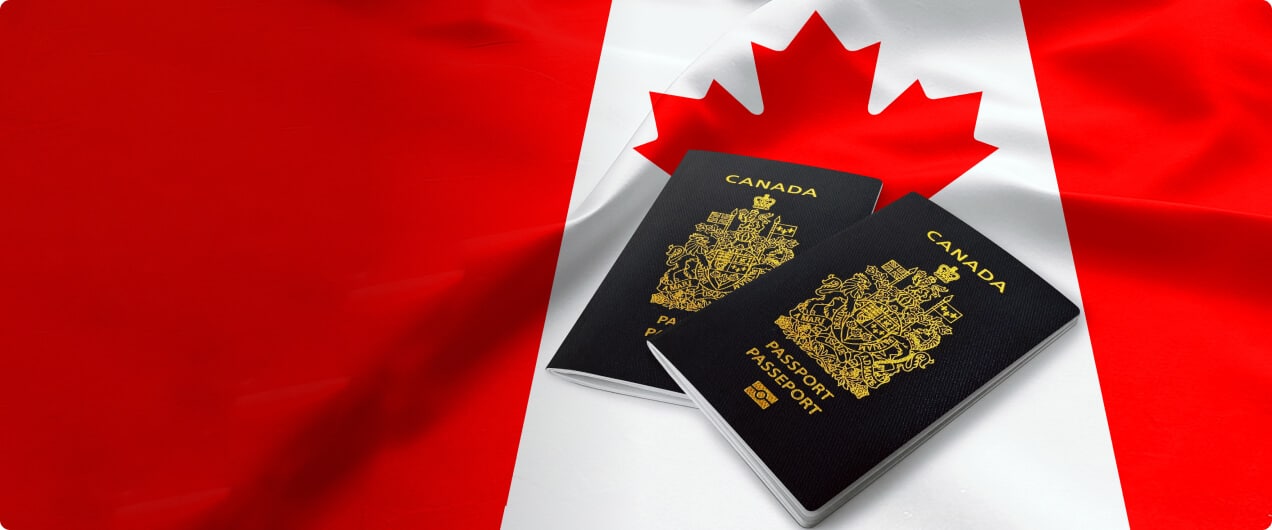
Schedule a Free Consultation Session with our Certified Immigration Consultants in Qatar
Documents required to apply for canada visit visa from qatar.
In order to effectively apply for a Canada visit visa from Qatar , qualified candidates must submit the following documents:
- A valid passport for travel or other travel document
- Two recent passport photographs
- An application fee
- A invitation letters from a friend or relative in Canada, if applicable
- Proof of financial support, such as bank statements or a letter from your employer
- A detailed intended travel itinerary
Once you have gathered all of the required documents, you can begin the online application process by creating an account. With the help of an online account, you will be able to access the online application form. Let DM Consultants in Qatar take care of the application, documentation, and complete process of a Canada tourist visa from Qatar with our years of extensive experience. Get started with us today by scheduling a brief consultation session for free.

Eligibility Criteria to Apply for Canada Visit Visa
To meet the eligibility to apply for a visit visa Canada from Qatar , you must meet the following requirements:
- You must have a valid passport or travel document
- You must be in good health
- You must have no criminal convictions
- You must strong evidence that you have enough money to support yourself during your stay in Canada
- You must be able to display that you have ties to your home country and that you will return home after your trip
If you are already planning to apply for a Visitor Visa, Business Visa, immigrant visas, non-immigrant visas, Canada Student Visa or any type of entry visitor visas , you may also need to provide additional documents, such as a letter of invitation from a friend or relative in Canada, proof of financial support, or a detailed travel itinerary. If you have any emergency situation to visit Canada, it is necessary to provide a proof of emergency. Contact DM Consultation in Qatar to know if you are eligible to apply for Canada visit visa or missing any critical requirements for visa.
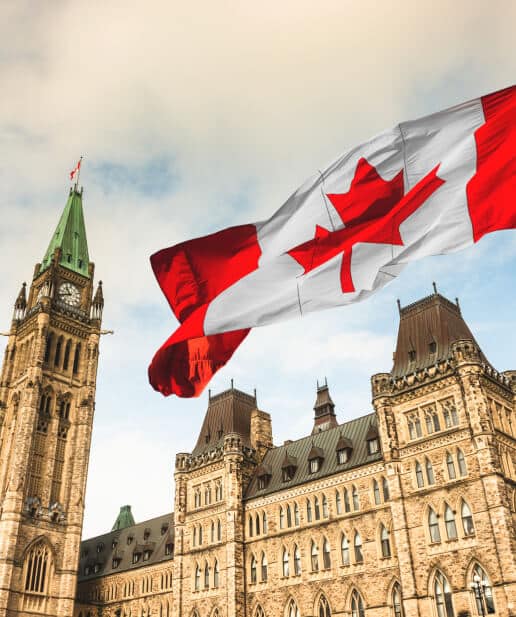
Canadian Immigration – How to Apply For A Canada Visit Visa from Qatar
One of the scintillating parts of the Canadian immigration process is the visit visa application. The visit visa permits foreign immigrants in Qatar to travel to the country within a particular period to visit the country either for business, tourism, relatives, or short-term courses. Canada is a land of opportunities and also an immigrant-friendly state, with various Canadian immigration programs available, little wonder it is a country of destination for immigrants all over the world.
- The first step in applying for a Canadian visa is to determine which valid visa program you qualify for. There are many different types of visas available, and each has its own specific requirements.
- Once you have determined which type of visa you need, you can begin the online application process by creating an account.
- Once you have created an account, you will be able to access the online application form. The consent form must be completed in full and all required documentation must be submitted before your application can be processed.
- Once your application has been submitted to the required visa application centre, you will need to book an appointment at the Canadian visa office in Qatar. During your appointment, a visa officer will review your application and supporting documentation.
- If your application is approved, you will be issued a visa and will be able to travel to Canada.
DM Consultants in Qatar take utmost pride in holding a track record of success in various Canadian immigration programs, and we aim to provide professional advice and help each visa applicant In Qatar to apply for the Canada visa from Qatar without the risk of rejections. Even if you are looking for a country for citizenship, DM Consultants can help you acquire that for Canada or any other preffered countries.

Apply Visit Visa for Canada with DM Consultants in Qatar
DM Consultants is one of the leading immigration firms in Qatar that offers an extensive range of services to individuals, families, and businesses interested in a visit or relocating to Canada. We operate with experienced immigration consultants who can help you with every aspect of the visa application process.
We can help you choose the right type of visa for your needs, complete the online application form and gather all of the required documents. We will also provide you with detailed instructions on how to submit your application and book your appointment at the Canadian visa office in Qatar.
- Free Consultation
- Visa services for all types of visitors visa
- Assistance with the online application process
- Guidance on gathering required documents, filling of forms, and emergency biometric
- Booking appointments at the visa office
- Detailed instructions on how to submit your application
If you are determined in applying for a Canada visit visa from Qatar, contact DM Consultants today to schedule a free consultation without any service charges. Our team of experienced immigration consultants will be happy to you with each step for the complete application period and additional services.

Skilled Migration Roadmap
Register online.
A person with the required work experience and skills can immigrate to a foreign country, register through our website and give wings to your dream.
You will get Call back within 10 Minutes
After registering yourself with us, you can expect a call from our experts. We offer free consultation!
Counseling session with our experts
Our certified immigration consultants will walk you through the skilled immigration requirements and process after reviewing your details.
Hassle free signup process
The signup process is extremely convienent & hasselfree ,you can use our online payment gateway to start your process quickly and working on gathering the documents
Documentation & Submission
Our highly experienced process officers will leave no stone unturned to get you nomination from federal or provincial government , your application will be filed with our RCIC & MARA representation making it 100% perfect and errorfree .
Visa Filing upon nomination
Once you receive the nomination our visa officers will make sure to file visa for you & your family in given timleline making sure no delays and laps in completion of the process .
Pre-landing & Post-landing services
Our services doesn’t end here, we are holding your hands until you migrate to Canada. Our post landing team will help you to settle in Canada hasslefree making sure you are prepared with all pre and post landing formalities before travel .
Get Ready to Fly
Signup with DM Immigration Consultants today the largest immigration consultants in the region , we are based in seven countries having 15 offices with 300 plus immigration experts!
Most Frequently Asked Questions on Canada Visit Visa
- Call me back

We are the best at what we do and these success stories are proof of it!
Hi, please enter your name and mobile number.
We'll call you back very soon :)
Hi, please enter your name and mobile number and book seminar.
Error: Contact form not found.
Get Free Assessment
Feel Free To Contact With Us
- Old Airport RD
Language selection
- Français fr
Application for a Visitor Visa (Temporary Resident Visa - TRV)
You need to give your biometrics.
In most cases, you now need to give your fingerprints and photo (biometrics) after you apply.
Find out who needs to give biometrics and how the new application process works.
Biometrics and the application process

We refer to your fingerprints and photo as biometrics. We collect biometrics for most applications. Find out what happens from when you submit your application to when you get to Canada and where biometrics fits in the process.
1. Apply for your visitor visa, study permit or work permit
If you want to visit, study or work in Canada, make sure you’re eligible to apply. Use our application guides to help fill out your application properly, then submit your application.
Avoid processing delays by sending us a complete application .
2. Get your fingerprints and photo taken
If you’re between 14 and 79 years old, you probably need to give your fingerprints and photo (biometrics).You only need to give your biometrics once every 10 years to make repeat trips to Canada easier.
- You must pay the biometrics fee when you submit your application. Otherwise you may experience delays.
- Get this done as soon as you get the letter from us that tells you to give biometrics.
- You have 30 days to do this from the date on the letter.
Find out who needs to give , how to give , and where to give your biometrics .
COVID-19: Biometrics deadline
Some biometrics collection sites are closed. If the site closest to you is closed, we’ll extend your deadline to give your biometrics. Find out how COVID-19 is affecting biometrics .
3. We process your application
After we get your biometrics, we start processing your application. See how long it takes to process your application.
If we need more information from you, we’ll contact you.
4. We make a decision on your application
When we finish reviewing your application, we let you know if you’re approved to come to Canada. If you are, we issue your documents.
If your application is refused, we send you a letter that tells you why.
5. You travel to Canada (if you’re approved)
Make sure you travel with the documents we gave you. This includes travel documents like a visitor visa, study or work permits or an eTA (electronically linked to your passport).
Airline staff and border service officers at ports of entry will ask to see your travel documents. If you don’t have them, you may not be able to board your flight to Canada.
Make sure children under 18 travel with the right documents .
6. We check your identity when you arrive in Canada
When you arrive, we check your identity to make sure that you are the same person who was approved to travel to Canada. We may use your biometrics to do this.
If we can’t verify your identity, you may be detained by a border services officer. These officers help protect the health and safety of Canadians.
If the officer determines that you’re not admissible to Canada, you won’t be allowed to enter Canada. If you came by air, you’ll have to take a return flight to where you came from.
7. You’re allowed to enter Canada
If you pass the identity check and meet the entry requirements , the border services officer stamps your passport and lets you know how long you can stay in Canada. You’re normally allowed to stay in Canada for up to six months.
Children under 18 must meet the same entry requirements as adults. The border services officer may ask minor children to show other documents depending on whether the child is travelling alone or with someone.
Basic entry requirements
You must meet some basic requirements to enter Canada. You must:
- have a valid travel document, like a passport
- be in good health
- have no criminal or immigration-related convictions
- convince an immigration officer that you have ties—such as a job, home, financial assets or family—that will take you back to your home country
- convince an immigration officer that you will leave Canada at the end of your visit
- The amount of money you will need depends on how long you will stay and if you will stay in a hotel, or with friends or relatives.
Some people are not admissible to Canada, which means they are not allowed to enter the country. You can be inadmissible for several reasons, including being involved in:
- criminal activity
- human rights violations
- organized crime
You can also be inadmissible for security, health or financial reasons.
Find out more about inadmissibility .
Biometrics fee
- Individual applicant: CAD $85
- Families applying at the same time : maximum total fee of CAD $170
- Groups of 3 or more performing artists and their staff who apply for work permits at the same time: maximum total fee of $CAD 255
You can apply online or on paper (in specific situations) for:
- visitor visas (also known as temporary resident visas)
- super visas (for parents and grandparents)
- transit visas
Apply online
Before you apply, make sure you need a visa to enter Canada. Find out what document you need to enter Canada .
You must have both of these to apply online:
- access to a scanner or camera to create electronic copies of your documents to upload
- a valid credit card to pay with
How you apply depends on what you apply for. Select the document you want to apply for to get instructions:
Visitor visa : Option 1 of 3
Apply for a visitor visa
Super visa (for parents and grandparents) : Option 2 of 3
Apply for a super visa
Transit visa : Option 3 of 3
Apply for a transit visa
Apply on paper (in specific situations)
Before you apply , make sure you need a visa to enter Canada. Find out what document you need to enter Canada .
Read the instruction guide to get all the details to apply on paper.
- Instruction Guide 5256
Once you have read the guide, you can prepare your application package. You must select the country or territory from which you will apply to get your local visa office instructions.
Permanent residents of Canada
We do not issue temporary resident visas (TRV) to permanent residents (PR). If you are outside Canada without a valid PR card, you must apply for a permanent resident travel document (PRTD) instead. If you meet the requirements for a PRTD, you can return to Canada as a PR.
If you no longer want to be a PR, or if you know you do not meet the requirements to keep your PR status, you can voluntarily give up (renounce) your PR status to apply for a TRV.
Application for Temporary Resident Visa
You can’t fill out and save the application form using your Internet browser. To use the form, you need to:
- Use your computer (Mac or PC). The form won’t open on mobile devices (iPads, tablets, mobile phones, etc.)
- Install Adobe Reader 10 (or higher)
- Download the PDF file to your computer . Save the file in a place you can remember.
- Make sure you use Adobe Reader to open the form. Sometimes if you try to open the form directly, it will use your Internet browser to try to open it.
Note: If you are applying online , you don’t need to print and sign the form. Leave the signature section empty.
Get the form
- Application for Temporary Resident Visa [IMM 5257] (PDF, 556.66 KB) June 2019
Having issues with the form?
- I can’t open my visa application form in PDF format. What can I do?
- After clicking the “validate” button on my visa application form, nothing happens and I don’t see the barcodes. Why is this happening?
How-to video

Find out if you are eligible

Living in Canada tool

Language selection
- Français fr
Guide 5256 - Applying for a visitor visa (temporary resident visa)
Use this guide to apply for: visitor visa, transit visa, super visa
Table of Contents
Before you apply, step 1. gather documents, step 2. complete the application, step 3. pay the fees, step 4. submit the application, what happens next, income table, temporary resident visa application photograph specifications.
This is not a legal document. The explanations and definitions are not legal definitions. In case of a discrepancy between the language in this document and the relevant legislation or regulations, the legal text in the legislation and regulations prevails.
For legal information, consult the following documents:
- Immigration and Refugee Protection Act
- Immigration and Refugee Protection Regulations
Application package
This application package has:
- an instruction guide, and
- the forms you need to fill out.
The instruction guide :
- has information you must know before you submit your application, and
- explains how to fill out the forms and gather your supporting documents.
Read the instruction guide completely and then fill out each of the applicable forms.
The forms are designed with questions that will help the processing of your application.
Symbols used in this guide
This guide uses these symbols to draw your attention to important information:
Important information that you need to know to avoid delays or other problems.
Where to get more information.
Note: Tips that will help you with this application.
Who may use this application guide?
Use this application guide if you wish to apply for a temporary resident visa from outside Canada.
Note: The processing time of an application may vary from one visa office to another. Find out more about application processing times .
Who are Visitors?
Visitors are persons who are not Canadian citizens or permanent residents of Canada, and are legally authorized to enter Canada to:
- visit Canada on holiday (vacation),
- visit family,
- conduct business, etc.
Visitors are restricted in length of stay and subject to various conditions.
Do I need a Temporary Resident Visa?
Persons who are not Canadian citizens or permanent residents of Canada may require a visa to enter Canada. The requirement for a visa also applies to temporary residents who are transiting in Canada. Find out if you need an Electronic Travel Authorization (eTA) or a visitor visa .
If you do not require a visa to enter Canada, you may require an Electronic Travel Authorization (eTA). Find out if you need an eTA .
What is a Temporary Resident Visa?
A Temporary Resident Visa (TRV), also referred to as a visitor visa, is an official document issued by a Canadian visa office that is placed in your passport to show that you have met the requirements for admission to Canada as a temporary resident (either as a visitor, a student, or a worker).
What are the requirements you must meet for a TRV?
You must show the officer that you meet the requirements of the Immigration and Refugee Protection Act (IRPA) and the Immigration and Refugee Protection Regulations and that you will be in Canada for a temporary stay.
You must also:
- satisfy an officer that you will leave Canada at the end of your stay,
- show that you have enough money to maintain yourself and your family members in Canada and to return home,
- not intend to work or study in Canada unless authorized to do so,
- be law abiding and have no record of criminal activity,
- not be a risk to the security of Canada,
- provide any additional document requested by the officer to establish your admissibility, and
- be in good health (complete a medical examination if required).
What if I was previously granted permanent resident status?
If you have ever been granted permanent residence or landed immigrant status in Canada, you may still be a permanent resident. We cannot issue you a TRV if you are a permanent resident.
You may instead want to apply for Travel Document (Permanent Resident Abroad) . If you meet the requirements for a travel document, you can return to Canada as a permanent resident.
If you no longer want to be a permanent resident, or if you know you do not meet the requirements to keep your permanent resident status, you can voluntarily give up (renounce) your permanent resident status in order to apply for a TRV.
Voluntary Renunciation of PR status applications must be sent in a separate envelope by mail to the visa office .
We recommend that you apply for Voluntary Renunciation of your PR status first, and apply for your TRV once you receive the approval of your Voluntary Renunciation.
Entry to Canada
Family member definitions.
Your family members include your spouse or common-law partner, your dependent children and any children that are their dependent children.
Refers to either of the two persons (any gender) in a marriage legally recognized in the country in which it took place, as well as in Canada.
Proxy, telephone, fax, internet and similar forms of marriage where one or both parties were not physically present are not considered as valid spousal relationships under the Regulations nor are polygamous marriages. For more information, consult our policy on the legality of a marriage .
Refers to a person who is living in a conjugal relationship with another person (any gender), and has done so continuously for a period of at least one year. A conjugal relationship exists when there is a significant degree of commitment between two people.
This can be shown with evidence that the couple share the same home, support each other financially and emotionally, have children together, or present themselves in public as a couple.
Common-law partners who have been in a conjugal relationship for at least one year, but are unable to live together or appear in public together because of legal restrictions in their home country or who have been separated for reasons beyond their control (for example, civil war or armed conflict) may still qualify and should be included on the application.
We assess your child’s eligibility as a dependant based on how old they were at a specific point in time, called the "lock-in date" . This is usually the date we received your application. To see if your child qualifies as a dependant, we consider the age of your child on the lock-in date , even though your child’s age may change during processing.
Your child or the child of your spouse or common-law partner can be considered a dependent child if that child meets the requirements below on the lock-in date :
- They’re under 22 years old , and
- They don’t have a spouse or common-law partner
Children 22 years old or older qualify as dependants if they meet both of these requirements:
- They have depended on their parents for financial support since before the age of 22, and
- They are unable to financially support themselves because of a mental or physical condition
With the exception of age, dependants must continue to meet these requirements until we finish processing your application.
Not sure if your child is a dependant? Check if your child qualifies by answering a few questions .
If your child’s age was locked in on or before October 23, 2017, a previous definition of dependent children may apply.
Refers to children of dependent children of the applicant and those of the spouse or common-law partner, if applicable.
Do I have to apply separately for my family members?
Family members must complete their own application forms. However, you may submit your applications together online or at a Visa Application Centre (VAC) and use one payment receipt for the total amount.
Your spouse or common-law partner and children must meet all of the requirements for temporary residence in Canada.
Are there medical requirements?
If you plan to work, visit or study in canada for six months or less:.
You usually do not need a medical exam.
If you plan to work, visit or study in Canada for more than six months:
You will need a medical exam if you:
- in any of these countries or territories
- in the one year immediately before the date you want to enter Canada. ( This applies even if you are a citizen of a country that does not need a visa to enter Canada. )
Regardless of the length of time you are in Canada, you will need a medical exam if you wish to work in one of the following fields:
- a designated occupation, such as the field of health services or with children. Examples of designated occupations include hospital staff, clinical laboratory workers, patient attendants in nursing and geriatric homes, and medical and dental students admitted to attend Canadian universities;
- to work in agricultural occupations, you will need a medical exam if you have lived in certain countries or territories .
You and your family members may need a medical exam to come to Canada. Find out more by checking the Medical examination requirements for temporary residents .
You may either:
- have an upfront medical exam by contacting a Panel Physician; or
- wait until your application is reviewed and medical instructions are given to you by the visa office.
Get the instructions to complete the medical exam.
When medical results are submitted up front, routine cases benefit from faster processing since we do not have to ask for them at a later date. This is done at your own cost and does not influence the final decision on your application. If you have an upfront medical exam, you must submit proof that you completed the medical exam with your application. Failure to do so may result in processing delays.
Biometric (fingerprints and photo) requirements
You may need to appear in person to have your fingerprints and photograph (biometric information) taken at a biometric collection service point. If your family members are also applying, they may need to appear in person to have their biometric information taken as well.
If you’re in Canada as a visitor and you apply for an initial study or work permit, you need to give your biometrics. As of December 3, 2019, you need to give biometrics when you apply from within Canada . You can go to a designated Service Canada location .
Find out if you need to give biometrics .
Note: If you need to give biometric fingerprints and photo, you do not need to include paper photos with your application.
How often do you give your biometrics
You only need to give your biometrics once every 10 years . You don’t need to give your biometrics again until the 10-year period expires.
If you gave biometrics in the past as part of an application for a visitor visa, work or study permit and they are still valid , you don’t need to give them again for this application.
Find out if your biometrics are still valid and when they expire by using the Check Biometric Status Tool .
When to give your biometrics
If you submit your application online or by mail..
You can give your biometrics after you:
- pay for and submit your application and biometric fees, and
- get a biometric instruction letter (BIL) that will direct you to a list of official locations you may choose from.
You must provide your biometric data promptly after receiving the instruction letter inviting you to do so.
If you submit your application in person at a visa application centre (VAC)
You may be able to book an appointment in advance to give your biometrics at the same time that you submit your application at a VAC. If you can’t give your biometrics when you submit your application you will have to make an appointment at the VAC to give them at a later date.
Where to give your biometrics
You need to book an appointment to give your biometrics at one of these official biometric collection service points .
We’ll start processing your application after we get your biometrics.
Can I work or study during my stay in Canada?
Visitors are not allowed to work or study in Canada unless they are authorized to do so under the Immigration and Refugee Protection Regulations . In many cases, a work or study permit will be required.
A temporary resident may also take a program of study up to six months duration without having to obtain a study permit.
Information about the parent and grandparent super visa
About the super visa.
The multiple-entry super visa allows parents and grandparents to
- enter Canada multiple times
- stay in Canada for a period of 5 years on each entry
Who may apply for a super visa?
To apply for a super visa, you must either be the parent or grandparent of a Canadian citizen or a permanent resident of Canada.
You cannot include your dependent children in this application. If your spouse or common-law partner want to come with you, they also need to submit an application.
How do I apply for a super visa?
To apply for a super visa, you need to submit an application to a visa office and provide
- You must also include your host child or host grandchild’s family composition (dependents, including spouse, children or other relatives that are financially dependent on your host child or host grandchild).
- If your child or grandchild does not have a paper copy of their notice of assessment, they can view (and print) their tax returns as well as other personal tax information using the Canada Revenue Agency’s My Account online service. To register or login, visit My Account .
- the most recent copy of the child or grandchild’s T4 or T1
- an original letter from child’s or grandchild’s employer stating their job title, job description and salary
- a letter from an accountant confirming annual income, if self-employed
- proof of other sources of income (for example, pension statement, investments)
- evidence of the parent or grandparent relationship to the Canadian citizen or permanent resident you wish to visit (such as a birth certificate, baptismal certificate or other official documents naming you as parent or grandparent)
- More information on approved insurance companies outside of Canada will be available in the coming months.
- be paid in full (quotes aren’t accepted)
- covers health care, hospitalization and repatriation
- provide a minimum coverage of $100,000, and
- be valid for each entry to Canada and be available for review by a border services officer, upon request
After you apply, you will also need to undergo a medical examination and provide proof of the results.
You will be required to appear in person to have your biometric fingerprints and photo (biometric information) taken at a biometric collection service point .
Visa-exempt applicants
You are not required to pay the application processing fee or provide your biometrics.
If your application is approved, you will be directed to apply for an electronic travel authorization (eTA). You will be provided with a letter that you will show to a border services officer upon arrival to Canada.
What must my child or grandchild do to meet the low income cut-off minimum?
You child or grandchild’s income must meet or exceed the minimum necessary cut-off, as identified annually in the income table .
In the letter of invitation , they must calculate their family size. This factor determines the amount of income required to provide care and support for you and your spouse, if applicable.
How to calculate family size:
- their spouse or common-law partner
- their dependent children
- any person they may have sponsored previously and for whom the sponsorship agreement and undertaking are still in effect
- your spouse or common-law partner, if you have one
- They add together the number of persons covered by steps 1 and 2. The total represents their family size.
- They look at the LICO in the income table in this guide to determine if they meet the minimum required for their family size.
- To demonstrate that they meet the minimum income required, your child or grandchild may include one of the documents listed in the document checklist (IMM 5484).
If your child or grandchild does not meet the LICO minimum, their spouse or common-law partner can assist by also providing a letter of invitation with one of the documents listed in the document checklist (IMM 5484).
What documents are required?
If you are outside of Canada, use the Document Checklist [IMM 5484] ( PDF , 1.12 MB ) to assist you in gathering the required documents to submit your application.
Some visa offices may require additional supporting documents specific to your country. For further information, check the Application for a Visitor Visa page.
If you are inside Canada, you must use the Document checklist – Applicants in Canada [IMM 5721] ( PDF , 0.91 MB ) to gather the documents required to submit your application to the Case Processing Centre – Ottawa (CPC-O) .
Minors travelling alone
Minors (under 18 years of age) travelling alone or with a person other than their parents or legal guardians should have a letter of authorization, preferably in English or French, signed by both parents or legal guardians. It should also include the name of the adult who will be responsible for the children in Canada.
Minors travelling with only one parent or legal guardian should have a letter of authorization, preferably in English or French, from the non accompanying parent or guardian.
Translation of documents
You must include the following along with any document that is not in English or French:
- the English or French translation; and
- an affidavit from the person who completed the translation (if they are not a certified translator ).
Translations may be done by:
- a person who is fluent in both languages (English or French, and the unofficial language); or
- a Canadian certified translator (a member in good standing of a provincial or territorial organization of translators and interpreters in Canada).
If the translation isn’t done by a Canadian certified translator, the person who completed the translation must provide an affidavit swearing to their language proficiency and the accuracy of the translation.
The affidavit must be sworn in the presence of:
- a notary public ;
- a commissioner of oaths ; or
- a commissioner of taking affidavits .
Authority to certify varies by province and territory . Consult your local provincial or territorial authorities.
Outside of Canada:
- a notary public
Authority to administer oaths varies by country . Consult your local authorities.
Note: An affidavit is a document on which the translator has sworn, in the presence of a person authorized to administer oaths in the country where the translator is living, that the contents of their translation are a true translation and representation of the contents of the original document. Translators who are certified in Canada don’t need to supply an affidavit.
Certified true copies
To have a photocopy of a document certified, an authorized person must compare the original document to the photocopy and must print all of the following on the photocopy:
- “I certify that this is a true copy of the original document”;
- the name of the original document;
- the date of the certification;
- the name of the authorized person;
- their official position or title; and
- their signature.
Who can certify copies?
Only authorized people can certify copies.
Important information: Certifying of copies must not be done by the applicants themselves nor by an applicant’s parent, guardian, sibling, spouse, common-law partner, conjugal partner, grandparent, child, aunt, uncle, niece, nephew or first cousin.
People authorized to certify copies include the following:
Authority to certify varies by province and territory. Check with your local provincial or territorial authorities to learn who has the authority to certify.
Outside Canada:
Authority to certify international documents varies by country. Check with your local authorities to learn who has the authority to certify in your country.
Filling out the application
The following are the forms that must be filled out and submitted:
- Application for Temporary Resident Visa [IMM 5257] ( PDF , 0.56 M B )
Family Information (IMM 5707 or IMM 5645)
- Document Checklist [IMM 5484] ( PDF , 1.12 M B )
- Document Checklist – Applicants in Canada [IMM 5721] ( PDF , 0.91 M B ) , if applicable
- Statutory Declaration of Common-law Union [IMM 5409] ( PDF , 0.78 MB) , if applicable
- Use of a Representative [IMM 5476] ( PDF , 1.53 M B ) , if applicable
- Authority to release personal information to a designated individual [IMM 5475] ( PDF , 1.52 M B ) , if applicable
Note: You may be required to complete additional supporting documents upon request of a visa officer.
Be complete and accurate
Complete all sections. If a section does not apply to you, write “Not Applicable” or “NA”, except for your name (last name and given name[s]). Refer to questions 1 and 2 under “ Personal Details ” section for further instructions. The application must be signed and dated.
If your application is incomplete it may be rejected and this will delay the processing of your application.
If you need more space for any section, print out an additional page containing the appropriate section, complete it and submit it along with your application .
Application for Temporary Resident Visa (IMM 5257)
Who must fill out this application form.
This form must be completed by each person applying for a Temporary Resident Visa to visit Canada.
Fill out the form
You must answer all the questions on this form unless instructed otherwise.
Download and fill out the form on a computer.
You also have the option to save your form and fill it out later.
Note: Filling out the form on a computer is easier and reduces mistakes that can slow down the application process.
Read and follow the questions below to help you fill out the form.
- Visitor visa : official document issued by a visa office that is placed in the passport which allows you to seek entry to Canada.
Note: To obtain a transit visa you must provide specific evidence of your travel itinerary from your transportation company or travel agent.
Personal Details
Type your family name (surname) exactly as shown on your passport or travel document (even if the name is misspelled). Do not use initials.
Note: If you do not have a family name on your passport or travel document, enter all your given names here and leave the given name field blank.
Type all of your given names (first, second, or more) exactly as shown on your passport or travel document (even if the name is misspelled). Do not use initials.
Note: If you do not have a given name on your passport or travel document, leave this field blank. Do not enter “*”, “Not applicable” or “NA”.
Nick names or Alias
Check the box to tell us if you have ever used any other name. This could include your birth name, maiden name, married name, nick name, etc.
If you checked “ Yes ”, type any other family name that you have ever used.
If you checked “ Yes ”, type any other given name (first, second, or more) that you have ever used.
Choose your gender ( F -Female, M -Male, U -Unknown or X -Another gender).
Note: If you choose a gender identifier that is different than what you currently have or have had on your Canadian temporary resident document (visa, electronic travel authorization, work permit, study permit or visitor record), you need to complete the Request for a Change of Sex or Gender Identifier (IRM 0002) form and send it with your application. You also need to complete this form and send it with your application if you’ve never had a Canadian temporary resident document but you intend to apply for one and you identify with a gender that is different than what appears on your foreign travel document or passport. No supporting documents are required.
Enter your date of birth. If your entire date of birth is unknown, please use ‘ * ’ (star sign or asterisk) to fill in the spaces for the year, month or day, where applicable.
Note, if your city, town, country or territory of birth is indicated in your passport or your travel document, please record it as it appears in the document.
Choose your country or territory of citizenship. To be a citizen of a country or territory means that you were either born in that country or territory (in most cases) or have been granted citizenship by that country or territory. If you are a citizen of more than one country or territory, choose the country or territory that issued the passport you will be using for this trip.
Choose the correct information:
- The name of the country or territory you live in, if you have been lawfully admitted to that country or territory.
- Permanent resident
- Protected Person
- Refugee Claimant
- Other: You must fill out this section if you chose “ Other ” as a status.
- The dates (From – To) you have been living in your country or territory of residence.
Check the box to tell us if during the past five years, you have lived in any other country or territory other than your country of citizenship or your current country or territory of residence (indicated above) for more than six months?
If you checked “ Yes ”, choose the correct information:
- The name of the country or territory you lived in;
- Other: You must fill out this section if you chose “ Other ” as a status;
- The dates (From – To) you were living in that country or territory.
Check the box to tell us if you are applying from the country or territory you live in.
If you checked “ No ”, choose the correct information:
- The name of the country or territory where you are applying from;
- The dates (From – To) that you have been living in that country or territory.
If you are not a citizen of the country or territory where you are applying, you must send proof of your legal status in the country or territory you live in when you submit your application.
- Choose your current marital status from the list below: Annulled Marriage This is a marriage that is legally declared invalid. An annulment can also be a declaration by the Catholic Church that the marital union did not have a binding force. Common - Law This means that you have lived continuously with your partner in a marital-type relationship for a minimum of one year. Divorced This means that you are officially separated and have legally ended your marriage. Married This means that you and your spouse have had a ceremony that legally binds you to each other. Your marriage must be legally recognized in the country where it was performed and in Canada. Separated This means that you are married, but are no longer living with your spouse. Single This means that you have never been married and are not in a common-law relationship. Widowed This means that your spouse has died and that you have not re-married or entered into a common-law relationship.
- Enter the date (year, month and day) you were married or you entered into your current common-law relationship.
- Type the family names and given names of your current spouse or common-law partner.
If you are in a common-law union, you must also fill out the Statutory Declaration of Common-law Union [IMM 5409] (PDF, 863 KB) form and include it with your application. If you are married, you must send a photocopy of your marriage licence or certificate with your application.
Check the box to tell us if you have ever been married or in a common-law relationship. If you checked “ Yes ”, enter the following information:
- All family names,
- All given names,
- Date of birth,
- Common-law, or
- Dates (From – To) for which you were in the relationship with your former spouse or common-law partner.
- Choose your native language (mother tongue).
- Check “Yes” or “No” to tell us if you have taken a test from a designated testing agency to test your abilities in English or French.
Type your valid passport or travel document number exactly as shown on the document. Make sure there is no space between each number or letter.
From the list, select the name of the country or territory that issued your passport or travel document.
Enter the date your passport or travel document was issued.
Enter the date your passport or travel document will expire.
For this trip – Check “Yes” or “No” to tell us if you are using a passport issued by the Ministry of Foreign Affairs in Taiwan that shows your personal identification number.
For this trip – Check “Yes” or “No” to tell us if you are using a National Israeli passport.
Note: There must be at least one blank page other than the last page available on each passport. If applying from outside Canada, refer to the responsible visa office for your region. If applying from inside Canada, a physical copy of your passport is not required at this time, and may be requested at a late date.
Venezuelan passport holders
You may need to complete extra steps when you fill out your application .
If the printed expiry date on your Venezuelan passport has passed
If the printed expiry date has passed and you’re applying for a visitor visa, study permit, work permit or to extend your stay as a temporary resident in Canada, follow these steps:
- Add 5 years to the printed expiry date shown on your passport and enter it in the expiry date field of the application form.
- Include a letter of explanation with your application stating: “I am a Venezuelan national with a Venezuelan passport, which has been extended for 5 years”.
Warning: If your passport is still expired after adding 5 years to the printed expiry date, your passport is considered expired. You’re not eligible to submit an application with that passport.
National Identity Document
Check “Yes” or “No” to tell us if you have a national identity document.
Enter your national identity document number exactly as shown on the document.
From the list, select the name of the country or territory that issued your national identity document.
Enter the date your national identity document was issued.
Enter the date your national identity document will expire.
Check “Yes” or “No” to tell us if you are a lawful Permanent Resident of the United States with a valid alien registration card (green card).
Enter your valid alien registration card (green card) document number exactly as shown on the document.
Enter when your alien registration card (green card) document will expire.
Contact Information
Type your current mailing address (where information should be mailed). Make sure you include the following information:
- Post Office Box (P.O. Box) number, if you have one. If you do not have a post office box number, you must type the street number,
- Apartment (Apt.) or Unit,
- Street number (No.). If you did not type in a P.O. Box number, you must type the street number,
- Street name. Do not abbreviate words (Street, Avenue, Boulevard, Drive, etc.) except for directions (NW, SE, W, etc.),
- City or Town,
- From the list, choose the country or territory of your current mailing address,
- Province or State,
- Postal code or zip code,
- District, if it applies to you.
All correspondence will go to this address unless you give us your e-mail address.
If you wish to have a representative who can conduct business on your behalf, you must give us their email and mailing addresses in this section and fill out the Use of a Representative ( IMM 5476 ) form.
Check the box to tell us if the address you live at is the same as your mailing address. If “ No ”, type the following information:
- Apartment (Apt.) or Unit, if it applies to you,
- Street Number (No.),
- Street Name. Do not abbreviate words (Street, Avenue, Boulevard, Drive etc.) except for directions (NW, SE, W, etc.),
- Country or territory,
- Postal Code or zip code,
Check the correct box to tell us if the telephone number is from Canada, the United States (US) or Other (any other country).
Choose the type of telephone:
- Residence (home)
- Cellular (cell or mobile)
- Business (work)
Type your telephone number including the country code, area or regional codes, etc.
If you have an extension number, write it after your phone number under “Ext.”
Check the correct box to tell us if your other telephone number is from Canada, the United States or Other (any other country).
Check the correct box to tell us if the facsimile (fax) number is from Canada, the United States or Other (any other country).
If you have one, type your facsimile (fax) number, including country code, area or regional codes, etc.
If you have one, type your e-mail address using a format similar to the following: [email protected]
Note: Make sure you check your email regularly. Any emails sent to you by Immigration, Refugees and Citizenship Canada (IRCC) will end in:
- “@cic.gc.ca”,
- “@canada.ca”, or
- “@international.gc.ca”.
Please add these to your “safe senders” list in your email program and check the junk mail folder in case important emails get filtered. If we find that your email address does not work or no longer exists, we will communicate with you by mail. By giving us your e-mail address, you are hereby authorizing us to send your correspondence, including file and personal information electronically to this address.
Details of Visit to Canada
- Short-term studies (course or program of six months or less)
- Returning student
- Returning worker
- Super visa — Parents and grandparents
- Other (medical visit, transit, etc.)
- Family Visit
Note: If you selected “ other ” in question 1a), provide details in 1b)
- Provide details.
Enter the dates (From – To) that you plan to stay in Canada.
Type the amount of funds (money) in Canadian dollars that you have available to you during your stay in Canada.
Type the following information about the person(s) or institution(s), including schools you intend to visit during your stay in Canada:
- Name (includes the name of a person or a name of an institution)
- Relationship you have with this person or institution (friend, family, co-worker, etc.)
- Their address in Canada (street number, street name, city or town and postal code).
Check the box to tell us if you have any post-secondary education (including university, college or apprenticeship training).
Examples of post-secondary education:
Training completed in a specific trade, such as carpentry or auto mechanics.
Training in a profession that requires formal education but not at the university level (for example, dental technician or engineering technician).
Academic degree awarded by a college or university to those who finished an undergraduate curriculum; also called a baccalaureate. Examples include a Bachelor of Arts, Science or Education.
Academic degree awarded by a graduate school of a college or university. You must have completed a Bachelor’s degree before a Master’s degree can be earned.
Highest university degree usually based on at least three years of graduate studies and a thesis. Normally, you must have finished a Master’s degree before a PhD can be earned.
If you checked “ Yes ”, give us full details of your highest level of post-secondary education:
- Enter the dates (year and month) you attended the institution
- Field(s) of study (mechanics, social sciences, medicine, etc. )
- School or Facility name
- City or Town
- Country or territory (choose from the list) and
- Province or State.
Employment (Work or job)
Enter the following information about your employment for the past 10 years. If you are retired, give information about the 10 years before your retirement.
Current activity or job
Give details about your current activity or job :
- dates (year and month) you have been working at your current job,
- activity or job, or a brief description of your position. If you do not work, describe what you are currently doing (retired, not working, going to school, etc. ),
- name of the company, employer or facility where you work,
- Province or State, if it applies to you.
Previous activity or job
Give details of your previous activity or job for the past 10 years. If you are retired, include the details about the 10 years before your retirement.
If you need more space, print out another page of the form, fill in this section and submit it with your application.
Background Information
All questions in this section must be answered or the application will be considered incomplete and will be returned.
Check the box to indicate if:
- you or any of your family members have ever had tuberculosis of the lungs or been in close contact with a person with tuberculosis within the past two years.
- you have any physical or mental disorder that would require social and/or health services other than medication during your stay in Canada.
- If you checked “ Yes ” to any of the above questions, provide details and the name of the family member, if applicable.
Note: Refer to the Family Members definition in this guide.
Check the box to indicate if you have ever:
- remained beyond the validity of your status, attended school without authorization or worked without authorization in Canada.
- been refused a visa or permit, denied entry or ordered to leave Canada or any other country or territory.
- Applied previously to enter or remain in Canada.
- If you checked “ Yes ” to one of the above questions, provide details.
- been arrested for, or
- been charged with or convicted of any criminal offence in any country or territory.
- Check the box to indicate if you have ever served in any military, militia, civil defence unit, served in a security organization or police force (including non-obligatory national service, reserve or voluntary units).
- If you answered “ Yes ” to question 4a), please provide your dates of service and the countries or territories where you served.
Check “ Yes ” or “ No ” to indicate if you have ever been a member or associated with any political party, or other group or organization which has engaged in or advocated violence as means to achieving a political or religious objective, or which has been associated with criminal activity at any time.
Check “ Yes ” or “ No ” to indicate if you have ever witnessed or participated in the ill treatment of prisoners or civilians, looting or desecration of religious buildings.
To complete your form:
Once the application is completed, click on the “Validate” button located at the top or bottom of the form. This will generate a barcode page (page 5 of 5) – see image below. If this application form is completed on a computer and printed, you must place the barcode page on the top of your application (or if applying as a group, each individual application package).
Note: This barcode page will not appear if you fill out your application by hand.
If you are 18 years of age or older , you must sign and date in the boxes provided at the bottom of the page.
If you are less than 18 years of age, your form must be signed by one of your parents or a legal guardian.
Note: By signing, you certify that you fully understand the questions asked, and that the information you have provided is complete, accurate, and factual. If you do not sign and date the application form, it will be returned to you.
Who needs to complete this form?
This form must be completed by each person, 18 years of age or older, applying for a Temporary Resident Visa, a study or work permit outside Canada.
Which form needs to be completed?
You must complete the Family Information form (IMM 5707 or IMM 5645) listed in the application package for your country.
Family Information (IMM 5707)
Write the personal details about:
- Check “ Yes ” if you were physically present at the marriage ceremony
- Check “ No ” if you were not physically present at the marriage ceremony
- Check “ Yes ” if your spouse was physically present at the marriage ceremony;
- Check “ No ” if your spouse was not physically present at the marriage ceremony.
- your parent 1 (mother or father); and
- your parent 2 (mother or father).
Check “ Yes ” or “ No ” to indicate if the person will accompany you to Canada.
Write: Family name and given name(s) (as shown on passport or travel document), name in native language (if applicable), date of birth, country or territory of birth (as shown on passport or travel document), present address (e.g. street name and number, city, country, postal code), marital status, and present occupation (job).
If a person is deceased, write “deceased” under “Present address”, and write the city/town, country and the date they died.
If not currently employed, please indicate if that person is retired, studying, etc.
You must answer all questions. If a section does not apply to you, write “Not applicable” or “N/A”.
Note: If you do not have a spouse, a common-law partner or conjugal partner, read “ Note 1 ” at the end of Section A, then sign and date the declaration.
Section B - Children
Write the personal details about your children. It is very important that you list all of your children even if they are already permanent residents or citizens of Canada, regardless of age or place of residence. This includes:
- married children;
- adopted children;
- children of your spouse (step-children) or common-law partner;
- any of your children who have been adopted by others; and
- any of your children who are in the custody of an ex-spouse, former common-law partner or other guardian.
Write: relationship (e.g. son, adopted daughter), family name and given name (as shown on passport or travel document), name in native language (if applicable), date of birth, country or territory of birth (as shown on passport or travel document), present address (e.g. street name and number, city, country, postal code), marital status, and present occupation (job).
If a person is deceased, indicate this under “Present address”, and write the city/town, country and the date they died.
If you require more space, please either add lines to the form by pressing the + button to the right or attach a separate sheet with the additional information.
Note: If you do not have any children, check the box “ I do not have any children ” and read “ Note 2 ” at the end of Section B, then sign and date the declaration.
Section C - Declaration
Sign and date in the sections provided.
Note: By signing, you certify that you fully understand the questions asked, and that the information you have given is complete, accurate and factual. If you do not sign or date the form, your application will be returned to you.
Important information: Once you have filled out the form, click on the “ Validate ” button located at the top of the form. Missing information will be identified by a pop up when you press the “Validate” button. You should fill out your forms on a computer and validate them electronically to reduce mistakes and help you submit forms that are complete.
Note: This form will not produce a barcode when it is validated.
For more information about the “validate” button, visit the Help Centre .
Family Information (IMM 5645)
- If you are married and you were physically present at the marriage, choose “married – physically present” in the marital status box.
- If you are married and you were not physically present at the marriage, choose “married – not physically present” in the marital status box.
- If you are married and your spouse was physically present at the marriage, choose “married – physically present” in the marital status box.
- If you are married and your spouse was not physically present at the marriage, choose “married – not physically present” in the marital status box.
- your mother,
- your father.
Include: full name, relationship, date of birth, marital status (married, single, widowed, common-law, divorced, separated, annulled marriage), present address and occupation (job), and if they will come with you to Canada by checking “ Yes ” or “ No ”.
If a person is deceased, write “deceased” under “Present address”, and write the city and the date they died.
Note: If you do not have a spouse or a common-law partner, read “ Note 1 ”, then sign and date the declaration at the end of Section A.
Write the personal details about your children. It is very important that you list all of your children even if they are already permanent residents or citizens of Canada. This includes:
Write full name, relationship, date of birth, marital status (married, single, widowed, common-law, divorced, legally separated, annulled marriage), present address and job, and if they will come with you to Canada by checking “ Yes ” or “ No ”.
If a person is deceased, indicate this under “Present address”, and write the city and the date they died.
Note: If you do not have children, read “ Note 2 ”, then sign and date the declaration at the end of Section B.
Section C – Brothers and Sisters
Write the personal details about your:
- brother(s),
- half-brother(s) and half-sister(s), and
- step-brother(s) and step-sister(s).
If a person is deceased, write this under “Present address”, and write the city and the date they died.
Section D – Certification
Sign and date the boxes at the bottom of the page.
Note: By signing, you certify that you fully understand the questions asked, and that the information you have given is complete, accurate and factual. If you do not sign or date the form, your application will be sent back to you.
Use of a Representative (IMM 5476)
Who may use this form.
Fill out this form only if you:
- are appointing a representative;
- need to update contact information for your previously appointed representative; or
- are cancelling a representative’s appointment.
If you have dependent children aged 18 years or older, they must fill out their own copy of this form if a representative is also conducting business on their behalf.
Who is a representative?
A representative is someone who:
- you have appointed by completing the IMM 5476 form;
- gives advice, consultation, or guidance to you at any stage of the application process; and
- has your consent to conduct business on your behalf with Immigration, Refugees and Citizenship Canada (IRCC) and the Canada Border Services Agency (CBSA).
You are not obliged to hire a representative. We treat everyone equally, whether they use the service of a representative or not.
For more information, see: Use of a Representative .
Notify IRCC about any changes
You must use this Web form to tell us if any information changes regarding the person you authorized to represent you on your application.
- an application processing fee;
- a biometric fee.
Find out if you need to give biometrics .
Use the table below to calculate the total amount of fees to be paid (all fees are in Canadian dollars). The processing fees must be included with your application. If you or your family members are required to provide biometric information, the biometric fee should be paid at the same time and the same way as the processing fee in order to avoid delays in processing your application.
Note: You may be required to pay fees in local currency.
Single or multiple entry temporary resident visa
The same fee applies to both types of visas. We’ll decide which visa to give you based on your application.
Find out more about the difference between single and multiple entry visas .
Fees are subject to change at any time.
Note: Make sure that you are eligible before you pay, and gather all the documents requested before you submit the application.
The fees will not be refunded, regardless of the final decision. For example, being found ineligible for a temporary resident visa is part of the processing; the fees will not be refunded. If you apply again, you will have to pay another processing fee and if applicable, another biometric fee.
Visa-exempt visitors applying for a super visa:
If you are a citizen of a country where you do not require a visa to visit Canada, you do not have to pay any processing fees. However you will have to satisfy all other requirements to obtain a super visa.
Find out if you need an Electronic Travel Authorization (eTA) or a visitor visa .
How to pay the fees for your application
To pay your fees for your application you’ll need:
- a valid e-mail address;
- access to a printer (you’ll need to print the receipt), and
- a credit card, Debit MasterCard ® or Visa ® Debit card.
Visit the link below and follow these instructions to pay:
- Go to Online Payment .
- At the end , click on the button to print the IRCC official receipt with barcode. Print two copies.
- Keep the second copy of the receipt for your records.
Incorrect fee payment
Incorrect fee payments may delay processing of your application.
Payment issue – No fee included
We will return your application.
Note: We will start processing your application after you return your application with the fees.
Payment issue – Not enough fees included
We will return your application and tell you of how much to pay.
Note: We will start processing your application once you return your application with the correct fees.
Payment issue – Overpayment
- start processing your application, and
- send you a refund.
Note: You do not have to ask for a refund, it will be done automatically.
Payment issue –Required biometric fee not included
- tell you the fee amount and how to pay it.
Note: We will continue processing of your application after you send the missing fees.
Where do I apply?
You may send your application to a Visa Application Center (VAC) that serves your area or apply online .
If I need to give my biometric fingerprints and photo, where do I go?
Outside Canada and the U.S.: At one of Canada’s Visa Application Centers (VAC) locations around the world.
In the United States: At one of many Application Support Centers across the U.S.
In Canada: Starting December 3, 2019, you can go to a designated Service Canada location .
At the port of entry: Asylum claimants, and applicants for work and study permits who are eligible to apply at the port of entry.
Consult the list of biometric collection service points .
If, for some reason, you can’t provide your biometric information (photograph and/or fingerprints) or if you need more than the 30 days, please contact us and be prepared to provide a detailed explanation.
In Canada: As of December 3, 2019, you can go to a designated Service Canada location .
Submit the document checklist
Make sure you complete the Document Checklist [IMM 5484] and include it with your application forms and supporting documents.
What should I submit with my application?
Make sure you complete the Document Checklist and include it with your application forms. Make sure you include all the supporting documents listed on the Document Checklist .
If your family members are also applying for TRVs, you can include your whole family's applications in the same envelope.
If you are a permanent resident (PR) overseas, and have decided to renounce (relinquish) your permanent resident status, you must submit your application for PR renunciation [IMM 5782] ( PDF , 1.59 M B ) in a separate envelope from your Temporary Resident application.
Temporary Resident applications may be submitted through a Visa Application Centre (VAC) or online, while the PR applications must be sent by mail separately to the visa office.
The application process
Completion check.
Once you have submitted your application, we will check to make sure that:
- you have properly completed and submitted all of the required application forms;
- you have paid the application processing fee; and
- you have sent all requested supporting documentation.
If your application package is incomplete:
- we will return it to you;
- we will not create a file; and
- we will not keep a record until you have submitted a complete application.
Note: To avoid processing delays, pay your biometric fees at the same time as your application processing fees, using the same method of payment.
Review for decision
Your application will undergo a detailed review by an officer. The officer will consider all the information and documentation you have provided, and will assess it and will decide if an interview is necessary. If so, you will be informed of the interview date, time and place.
If your application is refused, any original documents, including your passport if submitted with your application, will be returned to you with an explanation of why your application was refused.
Note: If we suspect that fraudulent documents were submitted, they will not be returned.
If your application is approved, any original documents, including your passport if submitted with your application, will be returned to you with the requested visa.
Visa-exempt visitors applying for a super visa
If your application is approved, your passport and documents will be returned to you with a letter of introduction.
Arrival in Canada
A valid Temporary Resident Visa is not a guarantee of entry into Canada. An officer at the port of entry will decide if you still meet the requirements for admission when you arrive.
If there has been a change in circumstances between the dates of your application for a visa and your arrival in Canada, or if subsequent information is given which was not originally available to the visa office, you may be refused entry.
When you arrive in Canada, the officer at the port of entry will determine whether you may enter Canada and how long you may stay. You must leave Canada on or before the date set by the officer or have your status extended by an officer in Canada. The stamp placed in your passport by a Canadian official is generally valid for a period of six (6) months unless another duration is specified by the official.
Parent and Grandparent super visa
If you applied for a super visa on or after June 22, 2023, your visitor status is valid for 5 years on each entry to Canada. See How long you can stay in Canada for more information.
You must leave Canada on or before the date set by the officer or apply to extend your stay before your status expires. It is your responsibility to maintain valid visitor status. If you enter Canada on or after June 22, 2023, and you have a stamp in your passport with no handwritten date, or if you have no stamp, you are allowed to stay for 5 years.
As a super visa holder, it is important to
- renew or maintain your health insurance while in Canada and on re-entry
- make sure your passport is valid while you’re in Canada
Note: for applicants who provided their biometric information as part of their application, when you arrive at the Canadian port of entry, the officer will:
- check your travel documents and compare you to the photo taken at the time of your application, and
- may ask you to proceed to a secondary inspection line where your fingerprints will be compared with the fingerprints that were taken at the time of your visa application.
What you can do to help processing
There are certain things you can do to help make sure your application is processed as fast as possible:
- submit all documents and information we have asked for with your application
- pay your application and biometric fees (if required)
- provide your biometrics as soon as possible (if required)
- mailing address;
- telephone numbers;
- facsimile number (fax);
- e-mail address.
Things that delay processing
The following may delay processing:
- unclear photocopies of documents;
- verification of your information and documents;
- a medical condition that may need more tests or consultations;
- a criminal or security issue;
- consultation is needed with other offices in Canada or abroad.
Current processing times
You can check current processing times on the Application processing times webpage.
Checking application status
See Check application status to find information on how to view your current status.
If you can’t view your current status, you may Contact Us to learn about your current status . To obtain details on how to remove your application status information from the Internet, visit the “ Frequently Asked Questions ” (FAQ) section.
Protecting your information
Your personal information, including biometric fingerprints and photograph, if given:
- may be shared with other Canadian government institutions as well as foreign governments as permitted under the provisions of the Privacy Act ,
- will be available to Immigration, Refugees and Citizenship Canada (IRCC) and the Canada Border Services Agency (CBSA) employees who need to see it in order to provide the services to you, and
- will not be disclosed to anyone else except as permitted under the provisions of the Privacy Act .
You can find more information about the protection of your data by visiting the Help Centre .
Find out more about the protection of your biometric information.
Quality Assurance Program
Our quality assurance program randomly chooses applications for a special review. If chosen, we will ask you to attend an interview with an IRCC official to:
- verify that the documentation and any other information you submitted is accurate,
- verify that your application has been completed properly.
Note: We will notify you in writing if your application is chosen.
Online services
For more information about the programs offered by IRCC, visit Immigration and Citizenship .
If you need help, you can find answers to your questions by visiting the Help Centre .
Income Table 2023
Your child or grandchild may use the following income scale to assess their ability to meet the income requirements.
Provide two photos meeting the requirement of the Visa application photograph specifications . On the back of two photos, write your name and date of birth.
Note: if you are required to provide biometric fingerprints and photo, you are not required to include paper photos with your application.
How-to video

Find out if you are eligible

Page details

Getting the Canadian Visa from Qatar made easy
Apply for a Canada Visa from Qatar
Canada is a popular destination for Qatari citizens, whether for tourism, business endeavors, or visiting family and friends. Fortunately, obtaining a Canada visa from Qatar is relatively straightforward. Here, we will comprehensively cover everything you need to know about applying for a Canada visa from Qatar.
HOW TO APPLY FOR A Canada Visa From Qatar
If you hold a Qatari passport, you’re in luck – Qatari passport holders do not require a visa for a short-term visit to Canada. Canada offers visa-free access to travelers holding a Qatari passport. The only document needed is an electronic travel authorization (eTA) for Canada, a quick and straightforward process. Qatari nationals can apply for this travel document, provided they meet the visa requirements for Qatari citizens.

Email was Sent
Please check Your email
Come to Canada
Get a free e-book to get you started on your journey!
We take the security of your personal information very seriously. All data and information disclosed on this site are highly confidential. Once you personal data is stored, we employ highly secure servers that restrict access to potential third parties.
Sign Up To Our Newsletter Today & Get a Free e-Book

Canadianvisa.org
We Make Immigration Simple
2020-07-12T01:00:00
Have you been wanting to apply for a Canada visa from Qatar but aren’t sure how to go about it or where to start? Here's how.
- Immigration
How to Apply for a Canada Visa from Qatar
Have you been wanting to apply for a Canada visa from Qatar but aren’t sure how to go about it or where to start? Deciding to immigrate to Canada is a big step, especially since there are so many things to think about before you do, such as how much it costs to live in Canada and what quality of life will be like for both you and your family, among others.
You may be wondering what level of healthcare and education Canada’s free public systems can provide, and not to mention whether or not there is a strong Qatari community in Canada. Are there enough jobs in Canada for skilled and unskilled immigrants alike that will pay you enough to be able to live affordably in Canada ?
The answer to all of these questions is that when you decide to move to Canada you will have said yes to a high quality of life including exceptional healthcare and education, a new career with exceptional work benefits and high paying salaries, and a new place to call home that is known for its multiculturalism, democracy, tolerance, and liberalism and not to mention its welcoming stance on immigration!
With over 341,000 Invitations to Apply (ITAs) for permanent residency up for grabs in 2020 alone and close to 4,000 people receiving ITAs every two weeks through immigration programs and systems such as the Express Entry system and Provincial Nominee Programs (PNPs), you could be living your Canadian dream sooner than you think.
How to Start the Canadian Immigration Process from Qatar

Starting the visa application for Canada from Qatar can be confusing and time-consuming but with the right professional by your side and these 5 easy steps , it doesn’t have to be.
Step 1: Assess Your Eligibility
To ensure that you aren’t disappointed when you apply for your Canada visa it is important to find out:
- If you are admissible to Canada (eligible to enter Canada); and
- Which immigration programs you are eligible for.
This will save you both time and money in the long run as there are over 70 different immigration programs and visas to choose from, each with its own set of requirements that need to be met.

Step 2: Choose Your Destination
Choosing your destination is not required for immigration programs under the Express Entry system but will help you narrow down your options when determining which Immigration options are best suited to your needs. For example, programs such as the Atlantic Immigration Pilot and Rural and Northern Immigration Pilots are specific to certain provinces in Canada. It is also a good idea to do research on provinces and territories that suit your specific needs, particularly affordability and job demand. To find out where your job is in demand in Canada visit our blog here .
Step 3: Choose Your Immigration Program
Choosing the right program for you is essential to your success when you apply for your Canada visa. For example, Express Entry is one of the most popular ways to immigrate to Canada but did you know that if you expressing interest in a particular province or territory or apply through an Express Entry-linked PNP, you may receive a provincial nomination , which is worth 600 extra points and seeing as the average Express Entry draw cut off score is 470, having a PN will all but guarantee to receive an invitation to apply for permanent residency.
Step 4: Gather Your Supporting Documentation
Even though you will only need your supporting documents when you actually start the visa application process it’s always a good idea to gather them in advance so that they can be verified and ready to go when you apply for your Canada visa from Qatar. As the saying goes, time is money, and you don’t want to waste either, especially seeing as the Canadian government has strict deadlines that must be adhered to in order for your application to be accepted.
Step 5: Start Your Canada Visa Application
Once all your paperwork is in order you can now start the process of applying for your Canada visa . Be sure to fill in each section completely and correctly as any mistake could result in your application being returned and ultimately delaying the entire process.
For more great tips on how to immigrate to Canada in 2020 , visit our blog here.
Since we've taken a look at the how-to let's take a look at the why-you-should, to help you decide if immigrating to Canada is the right choice for you and your loved ones.
5 Reasons You Won't Look Back After Moving to Canada from Qatar

1. Amazing Job Opportunities & Work Benefits
Canada’s job market is booming , offering plenty of opportunities for immigrants due to the labour market gap caused by industry expansion, a declining birth rate, and earlier retirement. This has inspired the Canadian government to search for some of the most talented and experienced global talents through immigration systems and programs such as the Express Entry system and various PNPs, no matter your skill level.
Canadian job offers usually come with attractive employment packages including high salaries and even better work benefits, such as working shorter hours (on average 36 - 40 hours per week) and paid parental leave of up to 55% of your average earnings for up to 61 weeks!
The average person in Canada earns roughly $14 per hour or $52,600 per year but can range anywhere between $22,800 to $747,000 annually . Canada also offers great work benefits, including healthcare contributions, paid vacation, maternal and paternal leave as well as insurance, to name a few . By having the right work experience, education, and a valid Canadian job offer you may be eligible to apply for permanent residence.
Take a look at where some of the most in-demand occupations in Canada are located , here.
For more information on the top 20 highest paying jobs in Canada in 2020 , visit our blog here.

2. Political and Economic Stability
Canada is ranked as one of the most politically and economically stable countries in the world. According to Investopedia, Canada has the world’s 10th largest economy , flourishing in sectors such as manufacturing, oil and gas drilling, construction, agriculture among others.
Canada’s government is very different from that of Qatar. It is run by a liberal democratic government and prides itself on tolerance, multiculturalism, and diversity as well as equality for all. This means that no matter your gender, race, sexual preferences, or religion you will be treated equally and without prejudice or persecution.

3. Perfect Place to Raise a Family
Canada is one of the best places to live and work, offering one of the highest qualities of life globally. Canada is not only one of the safest countries globally , coming in at number 10, but has a free universal healthcare and education system, low crime rates, breathtaking landscapes as well as vibrant and lively urban city centers to explore , making it one of the best places to raise a family . You can also take part in various outdoor activities as a family, such as taking an adventure to one of 46 national parks, spending the day at fun parks, or taking trips to museums and aquariums .

4. Freedom of Religion and Tolerance
Canada is one f the most tolerant place to live in the world and is accepting of all cultures, religions, and traditions including Christianity, Islam, Buddhism, Hinduism, Sikhism, and Judaism, which are the 6 major beliefs. You’ll find various places of worship and supportive communities all across the country to help you get used to your new life in Canada as an expat .
Canada is also known for its liberal way of life and was the fourth country in the world to legalize same-sex marriage in 2005 . Canada is not only multicultural, with over 200 global languages spoken nationally, but has permanent residents from all over the world living in Canada.

5. It’s Beautiful!
Canada boasts 48 awe-inspiring national parks, the magnificent Canadian Rockies, the spectacular Northern Lights, the majestic Niagara Falls, has over 2 million lakes, rivers, and fjords as well as a vast expanse of rolling landscapes to explore. And the best part is that most of these adventures are just a short car ride away from most major cities.
Canada also has 4 glorious seasons to enjoy with average temperatures ranging from 20 to 30 degrees Celsius in summer, which seems quite refreshing in comparison to the sweltering 45-degree celsius summer average in Qatar!
Ready to take the next step in your Canadian journey? Simply click the link below and let's begin!
Let Us Help You Apply for a Canadian Visa from Qatar

Applying for a visa can be time-consuming and confusing . With strict deadlines, procedures, and requirements to adhere to, it can be easy to make a mistake that could cost you your chance to immigrate to Canada from Qatar. But with the guidance and assistance of one of our knowledgeable Regulated Canadian Immigration Consultants (RCIC’s), the process will be stress-free.
When you choose to use our expert and government trusted services, you will receive:
- An in-depth eligibility assessment
- Guidance on which of 100+ immigration programs and visas to choose from;
- An immigration plan tailored to your individual needs;
- A review and submission of all application forms and documentation; as well as
- Support through every step of the application process.
All you have to do is fill out our application form to receive your eligibility assessment and let us take care of the rest. It’s just that simple! Your Canadian journey starts here.
Be sure to follow us on Facebook, Twitter, LinkedIn, and Instagram to stay up to date on Canadian immigration and visa news.
SHARE THIS ARTICLE
Recent posts
The newcomer's guide to renting a house in canada.
Worried about where you’ll live once you settle in the Great White North? Here’s everything you need to know about renting a house in Canada
Are You Covered? How Does Healthcare in Canada Work?
Uncover the ins and outs of Canada's healthcare system, from coverage to registration, ensuring newcomers are equipped with the knowledge to access th
Find a Job This Spring in Canada
Uncover the valuable tips and resources to kickstart your job search this spring in Canada, from updating your resume to exploring job opportunities a
10 Things Every Newcomer to Canada Should Prioritize
Learn how to prepare for life in Canada as a newcomer, ensuring your smooth transition and successful integration into Canadian society.
Get your free e-book today!
Want to learn more about Canada? Subscribe to our newsletter and get an e-book on Canadian immigration filled with mesmerizing sights of Canada!
CanadianVisa.org is a private recognized immigration agent and is not affiliated with the Canadian Government. Privacy policy
Back To Top
Language selection
Embassy of canada to qatar, in doha.
We provide services to Canadians visiting and living in Qatar.
Services and information
Adoption and surrogacy.
Process to adopt a child internationally and bring them back to Canada.
Birth abroad
Register a child's birth abroad.
Citizenship services
Steps to become a Canadian citizen. Get proof of citizenship.
Criminal record checks
How to get a criminal record check abroad, if required.
Death abroad
Steps to follow when a loved one dies abroad.
Marriage abroad
Requirements, documents and processes for getting married abroad.
Notarial services
Have your documents certified and authenticated.
Passport services
Apply for a passport and what to do if your passport is lost, stolen or damaged.
Pensions and retirement
Information on pensions and retiring outside of Canada.
Same-sex marriage abroad
Country specific information on same-sex marriage.
Studying abroad
Information on education or research opportunities in foreign countries.
Visa and immigration services
Apply to immigrate. Get a visa to study, work or visit Canada.
Voting abroad
Voting process for Canadians who live abroad.
Office information
Tornado Tower, 30th Floor, Corner of Majlis Al Taawon Street and Al Funduq Steet, Doha, Qatar
Telephone: (974) 4419-9000
Fax: (974) 4419-9035
Email: [email protected]
Hours of operation:
Email: [email protected]
Website: IRCC web form
Our representative

Isabelle Martin Ambassador of Canada to the State of Qatar

- Embassy of Canada to Qatar
Terms of service
X (Twitter)
- Canada in Qatar
Office closures
- Terms & Conditions

Qatar Embassy in
Ottawa - canada.

Ambassador Al-Mansouri meets the Director of Public Affairs at CPP Investments
His Excellency Dr. Khalid Bin Rashid Al-Mansouri met today with Mr. Eme Onuoha, Managing Director, Global Public Affairs for The Canadian Pension Plan Investments Board.

Ambassador Al-Mansouri meets Peter MacDougall
His Excellency Dr. Khalid Bin Rashid Al-Mansouri met today with H.E. Peter MacDougall Assistant Deputy Minister Global Issues and Development at Global Affairs Canada.
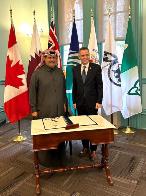
Ambassador Al-Mansouri meets Mayor Sutcliffe
His Excellency Dr. Khalid Bin Rashid Al-Mansouri met today with His Worship Mark Sutcliffe, The Mayor of Ottawa.

Ambassador Al-Mansouri meets Minister Hussen
His Excellency Dr. Khalid Bin Rashid Al-Mansouri met with The Honourable Ahmed Hussen, minister of International Development of Canada.

Ambassador Al-Mansouri Highlights Qatar's mediation efforts in resolving conflicts
His Excellency Dr. Khalid Bin Rashid Al-Mansouri participated as a speaker in the 3rd annual Middle East Strategy Forum organized by the Institute for Peace & Diplomacy.

Ambassador Al-Mansouri meets Lieutenant Governor of Alberta
His Excellency Dr. Khalid Bin Rashid Al-Mansouri met in Edmonton, with Her Honourable Salma Lakhani, Lieutenant Governor of the Province of Alberta.
Recent Events

The Embassy Celebrates the National Sport Day

The Embassy of Qatar receives two awards at the Heritage Food Exhibition
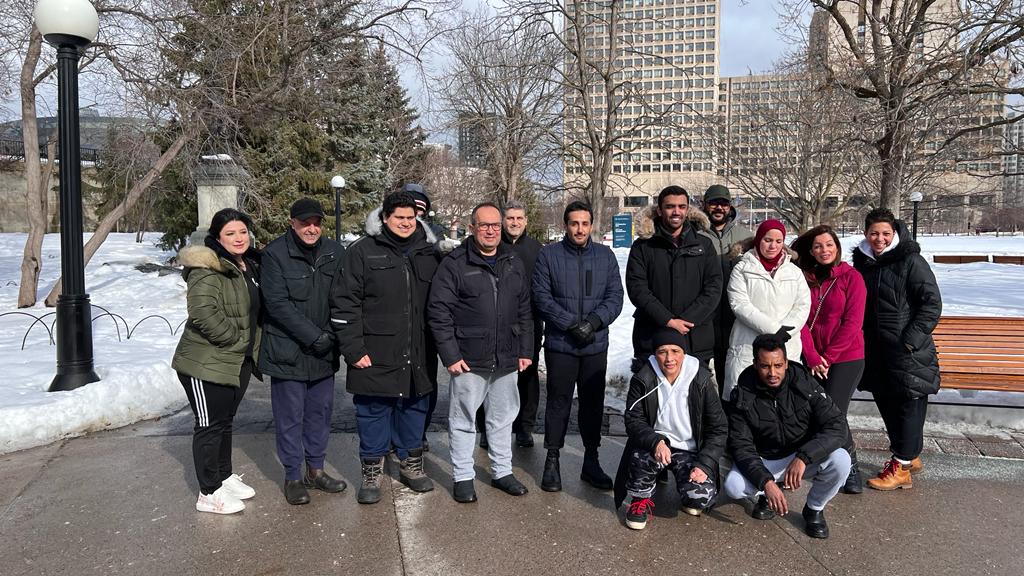
The Embassy’s staff organize Various National Sport Day Activities
- Citizen Services
- Attestation
- Foreigners in Qatar
- Issuance of Passports
- Issuance of passage permits to return to Qatar
- Issuance of passage permits for newly- born babies.
- Issuance of official authorization.
- Issuance of “to whom it may concern” certificate.
- Transport of dead body.
- Official Visa Service
- Attestation of commercial documents
- Civil documents
- Personal Documents
- Judicial Documents
- Educational documents
- Medical documents
- Other documents
- Issuance of “To whom it may concern” Certificate to be used for a driver’s license application.
- Validation of educational certificates
- Issuance of “Good conduct” Certificate.
- Meet our partners
- Advertise with us
10 frequently asked questions by visitors to Canada

Recent changes to visitor visa requirements for some Mexican nationals may leave some foreign nationals looking to visit Canada with questions about their own situation.
To assist, CIC News has compiled a list of frequently asked questions that may be helpful to review before expending the time, energy and money necessary to come to Canada.
How long can I stay in Canada as a visitor?
In most cases, visitors to Canada can remain in the country for six months from the day they enter Canada (or until their passport expires, whichever comes first). The date by which a visitor must leave Canada will be indicated by a stamp in their passport and/or a document provided to them by a Canada Border Services Agency (CBSA) officer.
Discover if You Are Eligible for Canadian Immigration
Visitors who would like to remain in Canada beyond their initially authorized stay can apply for an extension (more on this later).
What is the difference between a single and a multiple-entry visa?
As indicated by the name of the visa, single-entry visas permit the holder to enter Canada one time only, while a multiple-entry visa allows repeated entry to Canada so long as the visa remains valid.
Note: All visitor visa applicants are automatically considered for a multiple-entry visa but Immigration, Refugees and Citizenship Canada (IRCC) reviews each application separately and issues every visitor a visa accordingly.
IRCC clarifies that single-entry visa recipients will require a new visa to enter Canada once they have left, unless they are travelling directly to either the United States or St. Pierre and Miquelon.
Meanwhile, multiple-entry visas are valid for the shorter of the following two periods: 10 years or one month before the expiration of the visa holder’s passport. Every entry to Canada using a multiple-entry visa allows the visa holder to remain in Canada for up to six months at a time.
Can I fill out one visa application for my whole family if we are travelling together?
No. While all visitor visa applications for one group of family members may be submitted in the same envelope (alongside one payment receipt accounting for the total fee of all applications), everyone must complete and sign their own visitor visa application.
This rule also applies to any other required forms, excluding the Family Information form, which must only be completed by applicants 18 years or older.
Note: Parents and guardians can help their children fill out their form(s), and every visitor visa applicant under the age of 18 must have their document(s) signed by a parent/guardian.
Is there any way I can help a friend or family member visit Canada?
Although your friends and family members must complete their own visa applications, a letter of invitation is a document you can submit to help a loved one come to Canada.
It should be noted that this document, which details how you may help the visa applicant (ex. offering to pay for accommodation), can help but does not guarantee the applicant will be approved for their visitor visa.
Do I need a medical exam to get a visitor visa?
This depends on the visitor’s length of stay in Canada.
In most cases, visitors in Canada for six months or less do not require a medical exam unless they will be working in a job where the “protection of public health is essential.” The list of jobs under this requirement is available here .
The above public health protection condition also applies to visitors who will be in Canada for longer than six months. In addition, visitors in Canada for six months or longer will need a medical exam if they meet either of the following two requirements:
- The applicant has been, for six or more consecutive months, living or residing in a designated country or territory *
- The applicant is applying for a Parent and Grandparent Super Visa
*This applies to all visitors, even those who are citizens of visa-exempt countries, who have been in any of the eligible countries “in the one year immediately preceding the date [the visitor] sought entry into Canada.”
Is a visitor visa the same thing as a visitor record?
No. A visitor visa is required by foreign nationals looking to travel and enter Canada as a visitor (in most cases, for up to six months).
Conversely, a visitor record is provided by CBSA officers to either extend or restrict the recipient’s stay in Canada. This type of document may also be given to foreign nationals, by either CBSA or IRCC, after their application to extend their stay or restore their status in Canada is approved.
Click here for additional details regarding the difference between a visitor visa and a visitor record.
I got a new passport but I have a valid visa in my old one. Can I use the visa in my old passport?
IRCC notes that it is possible to travel to Canada using a valid visitor visa placed in an old passport. However, travellers in this situation must bring both of the following documents with them to Canada:
- The old passport with the valid visa*
- The new valid passport or travel document
*Travellers may need to explain to CBSA officers why their old passport is no longer valid
Note: To avoid processing delays at the Canadian border, IRCC recommends that all visitors to Canada obtain a new visitor visa in their new, valid passport.
How can I extend my stay as a visitor?
Extending your stay in Canada requires that you submit biometrics (fingerprints and a photograph) and apply for a visitor record. This document allows visitors to Canada three options to extend their stay in the country:
- As a visitor
- As a worker authorized to work in Canada without a work permit
- As a student authorized to study in Canada without a study permit
The steps to applying for a visitor record online can be found on this IRCC webpage .
Can I file an appeal if my visitor visa is denied?
There is no appeal process for a visitor visa application from IRCC.
When an applicant is denied a visitor visa to enter Canada, they may re-apply, but IRCC recommends that they only do so if their situation has changed, or they have new information to submit that may alter the outcome of their application.
Do I need a visa if I’m just travelling through Canada on my way to another country?
Documentation for those transiting through Canada depends on an indvidual’s unique situation.
Generally, travellers can be broken down into two categories: visa-required travellers (from a visa-required country ) and visa-exempt travellers (from a country that requires an electronic Travel Authorization , eTA).
Some visa-required travellers need a visitor visa. This applies to travellers who are:
- Visiting Canada (even if travelling by air and the traveller is in Canada for less than 48 hours)
- Staying in Canada for more than 48 hours while transiting through the country to another destination
- Crossing the Canadian border via any of the following five modes of transportation: bus, car, train, boat or cruise ship
Other visa-required travellers may only require a transit visa. This applies to travellers who:
- Have an international flight that stops at a Canadian airport on the way to another country
- Will be connecting between two international flights at a Canadian airport
- Will be transiting through Canada in 48 hours or less
- Do not have a valid visitor visa
Visa-exempt travellers need an eTA to transit through Canada by air. Travellers transiting through Canada by train, bus, boat or cruise ship are not required to obtain an eTA, but must still bring with them the correct travel documents .
- Canada Border Service Agency
- Canada News
- visitor visa
- Do you need Canadian immigration assistance? Contact the Contact Cohen Immigration Law firm by completing our form
- Send us your feedback or your non-legal assistance questions by emailing us at [email protected]
- Life in Canada

- Sponsor Content

- Express Entry
- Family Sponsorship
- Citizenship
Qatar is welcoming 102 countries visa-free, check your visa status here .

Visit Qatar App Explore things to do in Qatar!
Select your language
Get eVisa info

Plan your trip
Visa details
Citizens of over 102 countries are eligible for a visa-free entry to the State of Qatar. Allowable lengths of stay vary, and visitors are kindly advised to check with an authorised entity for the terms and conditions that apply.
Visa requirements
Visiting Qatar made easy
Visitors from all around the world can enter Qatar either by obtaining visa on arrival, or by filling out simple online applications, depending on the passport they carry.
This webpage is designed to keep you up-to-date on the visa policies that are relevant to you, and the process you need to follow to apply for a visa, if necessary.
Visa-free entry
Nationals of eligible countries do not require any prior visa arrangements and can obtain a visa waiver upon arrival to Qatar, by presenting a valid passport with a minimum validity of three months and a confirmed onward or return ticket.
For nationals of the countries/regions listed below, the waiver will be valid for 30 days from the date of issuance and entitle its holder to spend up to 30 days in Qatar.
Andorra, Australia, Azerbaijan, Belarus, Bolivia, Bosnia and Herzegovina, Brazil, Brunei, Canada, Chile, China, Colombia, Costa Rica, Cuba, Ecuador, Falkland Islands, French Guiana, Georgia, Guyana, Hong Kong, India, Indonesia, Iran, Ireland, Japan, Kazakhstan, Lebanon, Macao, Macedonia, Maldives, Mauritius, Mexico, Moldova, Monaco, Montenegro, New Zealand, Pakistan, Panama, Paraguay, Peru, Russia, Rwanda, San Marino, Singapore, South Africa, South Korea, Suriname, Thailand, United Kingdom, United States, Uruguay, Uzbekistan Vatican city and Venezuela.
For nationals of the countries/regions listed below, the waiver will be valid for 180 days from the date of issuance and entitle its holder to spend up to 90 days in Qatar during either a single trip or on multiple trips.
Antigua and Barbuda, Argentina, Austria, Bahamas, Belgium, Bulgaria, Croatia, Cyprus, Czech Republic, Denmark, Dominican Republic, Estonia, Finland, France, Germany, Greece, Hungary, Iceland, Italy, Latvia, Liechtenstein, Lithuania, Luxembourg, Malaysia, Malta, Netherlands, Norway, Poland, Portugal, Romania, Serbia, Seychelles, Slovakia, Slovenia, Spain, Sweden, Switzerland, Turkey and Ukraine.
Qatar-Oman Joint Tourist Visa (Visa on Arrival)
This visa is issued upon arrival and is valid for 30 days for the State of Qatar and the Sultanate of Oman. It allows for multiple entry to both countries and is extendable for an additional 30 days for a fee. Citizens of the following countries are eligible for the joint visa:
Andorra, Australia, Austria, Belgium, Brunei, Canada, Cyprus, Denmark, Finland, France, Germany, Greece, Hong Kong, Hungary, Iceland, Ireland, Italy, Japan, Liechtenstein, Luxembourg, Malaysia, Monaco, Montenegro, Netherlands, New Zealand, Norway, Poland, Portugal, San Marino, Singapore, South Korea, Spain, Sweden, Switzerland, United Kingdom, United States, Vatican City
Visa on arrival – mandated hotel requirement
The Ministry of Interior Qatar currently requires nationals of the countries / regions listed below to hold registration booked through Discover Qatar website prior to travelling to Qatar.
India, Iran, Pakistan, Thailand.
Tourist visas
The Qatar tourist visa is available to nationals of all countries, except GCC citizens, but citizens of over 101 countries are eligible for a free visa on arrival (see Visa-free entry above). Travellers of select nationalities will require to pay a fee to obtain a visa on arrival or apply for a tourist visa prior to travel. Visas can be applied for on the Hayya platform for a cost of QAR 100.
Afghanistan, Åland Islands, Albania, Algeria, American Samoa, Angola, Anguilla, Antarctica, Aruba, Bangladesh, Barbados, Belarus, Belize, Benin, Bermuda, Bhutan, Bonaire, Sint Eustatius and Saba, Botswana, Bouvet Island, British Indian Ocean Territory, Burkina Faso, Burundi, Cabo Verde, Cambodia, Cameroon, Cayman Islands, Central African Republic, Chad, Christmas Island, Cocos (Keeling) Islands, Comoros, Congo, Congo (the Democratic Republic of Congo), Cook Islands, Côte d'Ivoire, Curaçao, Djibouti, Dominica, Egypt, El Salvador, Equatorial Guinea, Eritrea, Ethiopia, Falkland Islands (Malvinas), Faroe Islands (the), Fiji, French Guiana, French Polynesia, French Southern Territories, Gabon, Gambia, Ghana, Gibraltar, Greenland, Grenada, Guadeloupe, Guam, Guatemala, Guernsey, Guinea, Guinea-Bissau, Haiti, Heard Island and McDonald Islands, Holy See (the), Honduras, Iran, Iraq, Isle of Man, Jamaica, Jersey, Jordan, Kenya, Kiribati, Korea (Democratic People's Republic of Korea), Kyrgyzstan, Laos, Lesotho, Liberia, Libya, Macao, Madagascar, Malawi, Mali, Marshall Islands, Martinique, Mauritania, Mauritius, Mayotte, Micronesia (Federated States of), Mongolia, Montenegro, Montserrat, Morocco, Mozambique, Myanmar, Namibia, Nauru, Nepal, New Caledonia, Nicaragua, Niger, Nigeria, Niue, Norfolk Island, Northern Mariana Islands, Palau, Palestine, Papua New Guinea, Philippines, Pitcairn, Puerto Rico, Réunion, Saint Barthélemy, Saint Helena, Ascension and Tristan da Cunha, Saint Kitts and Nevis, Saint Lucia, Saint Martin (French part), Saint Pierre and Miquelon, Saint Vincent and the Grenadines, Samoa, Sao Tome and Principe, Senegal, Sierra Leone, Sint Maarten (Dutch part), Solomon Islands, Somalia, South Georgia and the South Sandwich Islands, South Sudan, Sri Lanka, Sudan, Svalbard and Jan Mayen, Swaziland, Syrian Arab Republic, Taiwan (Province of China), Tajikistan, Tanzania, United Republic of Tanzania, Timor-Leste, Togo, Tokelau, Tonga, Trinidad and Tobago, Tunisia, Turkmenistan, Turks and Caicos Islands, Tuvalu, Uganda, United States Minor Outlying Islands, Vanuatu, Vietnam, Virgin Islands (British), Virgin Islands (U.S.), Wallis and Futuna, Western Sahara, Yemen, Zambia and Zimbabwe.
Applying for a visa using the Hayya platform
Thanks to a host of visa facilitation measures, Qatar is now the most open country in the Middle East. Visitors from all around the world can now enter Qatar either by obtaining visa on arrival, or by filling out simple online applications, depending on the passport they carry.
This webpage is designed to keep you up-to-date on the visa policies that are relevant to you, and the process you need to follow to apply for a visa, if necessary.
Hayya card validity extended until 2024
Are you a Hayya Card holder living outside the State of Qatar? We’ve got news!
The validity of the Hayya Card has been extended and will now allow Hayya Card holders to enter the State of Qatar until February, 2024.
Travel requirements:
- Proof of a confirmed hotel reservation or accommodation with family or friends approved through the Hayya portal
- Passport valid for no less than three months upon arrival in the State of Qatar
- Valid health insurance during the period of stay in the country. We recommend all travellers visiting the State of Qatar to have a valid health insurance policy covering Qatar's medical facilities. Those who don’t already have an insurance policy are welcome to purchase one on arrival in the State of Qatar. For more information on travel insurance, click here .
- Return tickets
All Hayya card holders visiting Qatar will have access to the following:
- The 'Hayya with Me' feature' allowing Hayya Card holders to invite up to three family members or friends
- A multiple-entry permit
- No fees will apply
Qatar Transit Visa
Qatar Airways passengers transiting in Hamad International Airport for a minimum of 5 hours are eligible to apply for the Qatar Transit Visa. It is free of charge, valid for up to 96 hours (four days) and open to passengers of all nationalities**.
For more information about Qatar Transit tours, please click here .
Visa Exemptions
Nationals of the Gulf Cooperation Council countries (Bahrain, Kuwait, Oman, Saudi Arabia and United Arab Emirates) do not require a visa to enter Qatar.
Mandatory health insurance
We recommend all travellers visiting the State of Qatar to have a valid health insurance policy covering Qatar's medical facilities. Those who don’t already have an insurance policy are welcome to purchase one on arrival in the State of Qatar. For more information on travel insurance, click here .
* Service fees only apply. ** All visas are approved and issued at the sole discretion of Qatar's Ministry of Interior.
Disclaimer: All visa rules and policies for international visitors are subject to change without notice and are approved and issued at the sole discretion of Qatar's Ministry of Interior.

Get expert help to book a dream Qatar trip
Need some help planning your next Qatar holiday or business trip? With Qatar Concierge, our dedicated travel team is here to help you book flights, plus guide you on the best hotels, restaurants, attractions and more. Call 0161 527 4409 and they’ll be happy to help. Please note that this service is not for visa queries, please visit our Visa page for more information.
Things to know before travelling
Want to travel visa-free? Check if you qualify here.
Getting here
Planning your trip to Qatar? Check how to get here.
Travel tips
Make the most of your visit with our handy travel guide.
Getting around
From a dhow boat to our world-class metro, here’s how to easily explore Qatar.
- Latest edition
- Media Centre
- Terms & conditions
- Privacy notice
- Corporate website
- Amiri Diwan
- Cookie policy
- Qatar Tourism brand logos
- Subscribe to our newsletter
- Cookie settings
© 2024 Qatar Tourism | All rights reserved

- Skip to main content
- Skip to "About this site"
Language selection
Search travel.gc.ca.
Help us to improve our website. Take our survey !
COVID-19: travel health notice for all travellers
Qatar travel advice
Latest updates: Entry and exit requirements – updated visa information
Last updated: April 10, 2024 10:57 ET
On this page
Safety and security, entry and exit requirements, laws and culture, natural disasters and climate, qatar - take normal security precautions.
Take normal security precautions in Qatar
Back to top
Regional conflicts
Conflicts in the Middle East and the Gulf region could affect Qatar. Regional tensions can flare up at any time, resulting in an unpredictable and volatile security situation.
- Monitor the security situation
- Follow the instructions of local authorities
There is a constant terrorist threat throughout the Arabian Peninsula. Reports of planned terrorist attacks occasionally emerge. Terrorists are likely to try to carry out attacks in Qatar.
Targets could include:
- government buildings, including schools
- places of worship
- airports and other transportation hubs and networks
- public areas such as tourist attractions, restaurants, bars, coffee shops, shopping centres, markets, hotels and other sites frequented by foreigners
Always be aware of your surroundings when in public places.
Be particularly vigilant during:
- sporting events
- religious holidays
- public celebrations
- major political events, such as elections
Terrorists may use such occasions to mount attacks.
The crime rate is low and violence is rare. However, credit card fraud does take place. Ensure that personal belongings, including your passport and other travel documents, are secure at all times.
Women’s safety
Although rare, women travellers may be subject to some forms of harassment, verbal abuse, or physical assaults. Local authorities’ response to reports of sexual violence may differ substantially from the Canadian context. Foreign women have been detained and accused of extramarital sex after reporting sexual assault.
- Avoid travelling alone after dark
- Be careful when dealing with strangers or recent acquaintances
- If you are the victim of a sexual assault, you should report it immediately to the nearest Government of Canada office
Advice for women travellers
Demonstrations
Demonstrations may occur. Even peaceful demonstrations can turn violent at any time. They can also lead to disruptions to traffic and public transportation.
- Avoid areas where demonstrations and large gatherings are taking place
- Monitor local media for information on ongoing demonstrations
Mass gatherings (large-scale events)
Desert excursions
Desert excursions can be hazardous. Off-road driving should only be undertaken in a convoy of four-wheel drive vehicles with an experienced guide.
If engaging in desert expeditions or trekking:
- never do so alone
- always hire an experienced guide from a reputable company
- travel in a 4 x 4 vehicle
- buy travel insurance that includes helicopter rescue and medical evacuation
- ensure that your physical condition is good enough to meet the challenges of your activity
- avoid venturing off marked trails
- ensure that you're properly equipped and well informed about weather and other conditions that may pose a hazard
- carry sufficient water supply and pay attention to the symptoms of dehydration and heatstroke, both of which can be fatal
- inform a family member or friend of your itinerary, including when you expect to be back
- obtain detailed information on each activity before setting out
Road safety
Road conditions.
Road conditions can vary greatly throughout the country. While the roads in Doha are generally in good condition, they are often over-crowded and commonly under construction. Outside of Doha, poorly lit roads and wandering livestock may pose a risk. Roads can be muddy during the winter rain season.
Driving safety
Traffic drives on the right.
Accidents causing fatalities are common and one of Qatar's leading causes of death. Drivers don't generally drive safely. They often drive at excessive speeds, are extremely aggressive and reckless. They don't respect traffic laws.
In case of an accident:
- move the vehicle to the nearest parking area if you can so do safely; you can be fined for blocking traffic
- call 999 and wait for the police to arrive
Leaving the scene is considered a criminal offence.
Public transportation
A public bus system is available, though, it runs limited routes.
Officially marked taxis are metered.
- Use officially marked taxis only
- Negotiate fares in advance, or insist that the driver use the meter
- Avoid taking shared taxis
- Never enter a cab if it already has one or more passengers
Private car services
Ridesharing application and limousine services are available and a popular method of transportation.
- Be vigilant when travelling in a private car
- Take note of the driver and vehicles' information
Marine transportation
Iran and the United Arab Emirates both claim sovereignty over the islands of:
Some vessels entering these areas have been reported detained.
Exercise caution if travelling by sea in the Gulf. Pirate attacks and armed robbery against ships have also occurred in coastal waters. Mariners should take appropriate precautions.
Live piracy report - International Maritime Bureau
We do not make assessments on the compliance of foreign domestic airlines with international safety standards.
Information about foreign domestic airlines
Every country or territory decides who can enter or exit through its borders. The Government of Canada cannot intervene on your behalf if you do not meet your destination’s entry or exit requirements.
We have obtained the information on this page from the Qatari authorities. It can, however, change at any time.
Verify this information with the Foreign Representatives in Canada .
Entry requirements vary depending on the type of passport you use for travel.
Before you travel, check with your transportation company about passport requirements. Its rules on passport validity may be more stringent than the country’s entry rules.
Regular Canadian passport
Your passport must be valid at least 6 months beyond the date you expect to leave Qatar.
Passport for official travel
Different entry rules may apply.
Official travel
Passport with “X” gender identifier
While the Government of Canada issues passports with an “X” gender identifier, it cannot guarantee your entry or transit through other countries. You might face entry restrictions in countries that do not recognize the “X” gender identifier. Before you leave, check with the closest foreign representative for your destination.
Other travel documents
Different entry rules may apply when travelling with a temporary passport or an emergency travel document. Before you leave, check with the closest foreign representative for your destination.
Useful links
- Foreign Representatives in Canada
- Canadian passports
Tourist visa: not required Business visa: not required Student visa: required Work permit: required Residence permit: required
Visas – Qatar Tourism
Residence and work permits
You must have both a residence and work permit to work in Qatar. To receive these permits, you must be sponsored by an employer.
While most employees are free to leave and enter Qatar, the employer controls the issuance of exit permits for essential employees. The employer may designate up to 5% of its employees as “essential.” If you are identified as an “essential employee”, you must obtain your employer's permission to exit Qatar, even for personal or emergency travel.
In the event of a contract or employment dispute, Qatari authorities refer to the Arabic language of a contract.
Entry bans
You could be denied entry into Qatar if your passport bore an Israeli visa, an Israeli border stamp or an Egyptian or Jordanian border stamp issued by an office bordering Israel.
Local authorities may prevent you from leaving Qatar if you have incurred loans and debts with a Qatari institution. You must be free of loans and debts to leave the country.
Similarly, a pending legal proceeding may cause authorities to issue a travel ban that would prevent you from leaving Qatar.
Health insurance
You must obtain a health insurance policy recognised by the Qatari Ministry of Public Health to enter Qatar. You can find the list of recognised insurance providers and purchase the insurance policy online.
- Mandatory Health Insurance Scheme – Ministry of Public Health of Qatar
- List of registered insurance providers – Ministry of Public Health of Qatar
Children and travel
Learn more about travelling with children .
Yellow fever
Learn about potential entry requirements related to yellow fever (vaccines section).
Relevant Travel Health Notices
- Global Measles Notice - 13 March, 2024
- COVID-19 and International Travel - 13 March, 2024
This section contains information on possible health risks and restrictions regularly found or ongoing in the destination. Follow this advice to lower your risk of becoming ill while travelling. Not all risks are listed below.
Consult a health care professional or visit a travel health clinic preferably 6 weeks before you travel to get personalized health advice and recommendations.
Routine vaccines
Be sure that your routine vaccinations , as per your province or territory , are up-to-date before travelling, regardless of your destination.
Some of these vaccinations include measles-mumps-rubella (MMR), diphtheria, tetanus, pertussis, polio, varicella (chickenpox), influenza and others.
Pre-travel vaccines and medications
You may be at risk for preventable diseases while travelling in this destination. Talk to a travel health professional about which medications or vaccines may be right for you, based on your destination and itinerary.
There is a risk of hepatitis A in this destination. It is a disease of the liver. People can get hepatitis A if they ingest contaminated food or water, eat foods prepared by an infectious person, or if they have close physical contact (such as oral-anal sex) with an infectious person, although casual contact among people does not spread the virus.
Practise safe food and water precautions and wash your hands often. Vaccination is recommended for all travellers to areas where hepatitis A is present.
Yellow fever is a disease caused by a flavivirus from the bite of an infected mosquito.
Travellers get vaccinated either because it is required to enter a country or because it is recommended for their protection.
- There is no risk of yellow fever in this country.
Country Entry Requirement*
- Proof of vaccination is required if you are coming from a country where yellow fever occurs.
Recommendation
- Vaccination is not recommended.
- Discuss travel plans, activities, and destinations with a health care professional.
- Contact a designated Yellow Fever Vaccination Centre well in advance of your trip to arrange for vaccination.
About Yellow Fever
Yellow Fever Vaccination Centre
* It is important to note that country entry requirements may not reflect your risk of yellow fever at your destination. It is recommended that you contact the nearest diplomatic or consular office of the destination(s) you will be visiting to verify any additional entry requirements.
In this destination, rabies is carried by dogs and some wildlife, including bats. Rabies is a deadly disease that spreads to humans primarily through bites or scratches from an infected animal. While travelling, take precautions , including keeping your distance from animals (including free-roaming dogs), and closely supervising children.
If you are bitten or scratched by an animal while travelling, immediately wash the wound with soap and clean water and see a health care professional. Rabies treatment is often available in this destination.
Before travel, discuss rabies vaccination with a health care professional. It may be recommended for travellers who are at high risk of exposure (e.g., occupational risk such as veterinarians and wildlife workers, children, adventure travellers and spelunkers, and others in close contact with animals).
Measles is a highly contagious viral disease. It can spread quickly from person to person by direct contact and through droplets in the air.
Anyone who is not protected against measles is at risk of being infected with it when travelling internationally.
Regardless of where you are going, talk to a health care professional before travelling to make sure you are fully protected against measles.
Hepatitis B is a risk in every destination. It is a viral liver disease that is easily transmitted from one person to another through exposure to blood and body fluids containing the hepatitis B virus. Travellers who may be exposed to blood or other bodily fluids (e.g., through sexual contact, medical treatment, sharing needles, tattooing, acupuncture or occupational exposure) are at higher risk of getting hepatitis B.
Hepatitis B vaccination is recommended for all travellers. Prevent hepatitis B infection by practicing safe sex, only using new and sterile drug equipment, and only getting tattoos and piercings in settings that follow public health regulations and standards.
The best way to protect yourself from seasonal influenza (flu) is to get vaccinated every year. Get the flu shot at least 2 weeks before travelling.
The flu occurs worldwide.
- In the Northern Hemisphere, the flu season usually runs from November to April.
- In the Southern Hemisphere, the flu season usually runs between April and October.
- In the tropics, there is flu activity year round.
The flu vaccine available in one hemisphere may only offer partial protection against the flu in the other hemisphere.
The flu virus spreads from person to person when they cough or sneeze or by touching objects and surfaces that have been contaminated with the virus. Clean your hands often and wear a mask if you have a fever or respiratory symptoms.
Coronavirus disease (COVID-19) is an infectious viral disease. It can spread from person to person by direct contact and through droplets in the air.
It is recommended that all eligible travellers complete a COVID-19 vaccine series along with any additional recommended doses in Canada before travelling. Evidence shows that vaccines are very effective at preventing severe illness, hospitalization and death from COVID-19. While vaccination provides better protection against serious illness, you may still be at risk of infection from the virus that causes COVID-19. Anyone who has not completed a vaccine series is at increased risk of being infected with the virus that causes COVID-19 and is at greater risk for severe disease when travelling internationally.
Before travelling, verify your destination’s COVID-19 vaccination entry/exit requirements. Regardless of where you are going, talk to a health care professional before travelling to make sure you are adequately protected against COVID-19.
Safe food and water precautions
Many illnesses can be caused by eating food or drinking beverages contaminated by bacteria, parasites, toxins, or viruses, or by swimming or bathing in contaminated water.
- Learn more about food and water precautions to take to avoid getting sick by visiting our eat and drink safely abroad page. Remember: Boil it, cook it, peel it, or leave it!
- Avoid getting water into your eyes, mouth or nose when swimming or participating in activities in freshwater (streams, canals, lakes), particularly after flooding or heavy rain. Water may look clean but could still be polluted or contaminated.
- Avoid inhaling or swallowing water while bathing, showering, or swimming in pools or hot tubs.
Typhoid is a bacterial infection spread by contaminated food or water. Risk is higher among children, travellers going to rural areas, travellers visiting friends and relatives or those travelling for a long period of time.
Travellers visiting regions with a risk of typhoid, especially those exposed to places with poor sanitation, should speak to a health care professional about vaccination.
Insect bite prevention
Many diseases are spread by the bites of infected insects such as mosquitoes, ticks, fleas or flies. When travelling to areas where infected insects may be present:
- Use insect repellent (bug spray) on exposed skin
- Cover up with light-coloured, loose clothes made of tightly woven materials such as nylon or polyester
- Minimize exposure to insects
- Use mosquito netting when sleeping outdoors or in buildings that are not fully enclosed
To learn more about how you can reduce your risk of infection and disease caused by bites, both at home and abroad, visit our insect bite prevention page.
Find out what types of insects are present where you’re travelling, when they’re most active, and the symptoms of the diseases they spread.
There is a risk of chikungunya in this country. The risk may vary between regions of a country. Chikungunya is a virus spread through the bite of an infected mosquito. Chikungunya can cause a viral disease that typically causes fever and pain in the joints. In some cases, the joint pain can be severe and last for months or years.
Protect yourself from mosquito bites at all times. There is no vaccine available for chikungunya.
Animal precautions
Some infections, such as rabies and influenza, can be shared between humans and animals. Certain types of activities may increase your chance of contact with animals, such as travelling in rural or forested areas, camping, hiking, and visiting wet markets (places where live animals are slaughtered and sold) or caves.
Travellers are cautioned to avoid contact with animals, including dogs, livestock (pigs, cows), monkeys, snakes, rodents, birds, and bats, and to avoid eating undercooked wild game.
Closely supervise children, as they are more likely to come in contact with animals.
Cases of locally-acquired Middle East respiratory syndrome (MERS) have been reported in this country.
MERS is a viral respiratory disease caused by the Middle East respiratory syndrome coronavirus (MERS-CoV).
Some people infected with MERS-CoV experience no symptoms, while others may experience mild flu-like or more severe pneumonia-like symptoms. About one-third of reported cases have result ed in death.
Eat and drink safely , and avoid close contact with animals, especially camels. If you must visit a farm or market, make sure you practise good hygiene and wash your hands before and after contact with animals.
There is currently no licensed vaccine to protect against MERS.
Person-to-person infections
Stay home if you’re sick and practise proper cough and sneeze etiquette , which includes coughing or sneezing into a tissue or the bend of your arm, not your hand. Reduce your risk of colds, the flu and other illnesses by:
- washing your hands often
- avoiding or limiting the amount of time spent in closed spaces, crowded places, or at large-scale events (concerts, sporting events, rallies)
- avoiding close physical contact with people who may be showing symptoms of illness
Sexually transmitted infections (STIs) , HIV , and mpox are spread through blood and bodily fluids; use condoms, practise safe sex, and limit your number of sexual partners. Check with your local public health authority pre-travel to determine your eligibility for mpox vaccine.
Medical services and facilities
Health care is very good in Qatar.
The country has a strong public healthcare system. Private institutions are also accessible and provide good healthcare.
Make sure you get travel insurance that includes coverage for medical evacuation and hospital stays.
Travel health and safety
Keep in Mind...
The decision to travel is the sole responsibility of the traveller. The traveller is also responsible for his or her own personal safety.
Be prepared. Do not expect medical services to be the same as in Canada. Pack a travel health kit , especially if you will be travelling away from major city centres.
Qatari and Canadian criminal law systems are significantly different. Laws, penalties and legal procedures may vary.
You must abide by local laws.
Learn about what you should do and how we can help if you are arrested or detained abroad .
Legal process
Suspects and witnesses to incidents may be detained with limited or no access to legal counsel or consular officials for 3-5 days.
Qatari officials may issue a travel ban pending the resolution of the case. These processes can last up to several years.
Penalties for possession, use or trafficking of illegal drugs are severe. Convicted offenders can expect heavy fines and lengthy jail sentences.
The consumption of alcohol in public is illegal. Avoid drinking alcohol outside licensed premises.
Drugs, alcohol and travel
2SLGBTQI+ travellers
Qatari law criminalizes sexual acts and relationships between persons of the same sex.
2SLGBTQI+ travellers could also be discriminated against or detained based on their sexual orientation, gender identity, gender expression, or sex characteristics.
Those convicted can face up to ten years in prison.
2SLGBTQI+ travellers should carefully consider the risks of travelling to Qatar.
Travel and your sexual orientation, gender identity, gender expression and sex characteristics
In 2024, the lunar month of Ramadan is expected to begin on or around March 10.
In public, between sunrise and sunset, refrain from:
Religious proselytism
Religious proselytism is illegal.
Avoid engaging in religious activities that contradict or challenge Islamic teachings and values. This includes preaching, possessing, or distributing religious literature or material.
Dress and behaviour
Qatar customs, laws and regulations adhere closely to Islamic practices and beliefs.
Public displays of affection, including holding hands and kissing, is not well socially accepted.
Foreign female travellers are not typically expected to wear head covers. However, revealing clothing is considered inappropriate.
To avoid offending local sensitivities:
- dress conservatively
- behave discreetly
- respect religious and social traditions
- seek permission from locals before photographing them
Common law partnership is illegal in Qatar. Men and women are not permitted to share a home unless they are legally married or are related to one another.
If you marry a Qatari citizen, the Qatari government may inform you that you have lost your Canadian citizenship. Foreign governments don't have the authority to strip you of your Canadian citizenship. If this occurs, contact the nearest Canadian government office as soon as possible.
Sexual relations outside of marriage are a criminal offence.
Marriage outside Canada
Qatar family law is different from Canadian family law. Decisions are based on Islamic law.
Children of a Qatari father automatically acquire Qatari citizenship at birth. They must enter and leave the country on a Qatari passport.
If you are involved in a custody dispute in Qatar, consult a Qatari lawyer for advice and assistance regarding your own specific situation.
International Child Abduction
The Hague Convention on the Civil Aspects of International Child Abduction is an international treaty. It can help parents with the return of children who have been removed to or retained in certain countries in violation of custody rights. It does not apply between Canada and Qatar.
If your child was wrongfully taken to, or is being held in Qatar by an abducting parent:
- act as quickly as you can
- consult a lawyer in Canada and in Qatar to explore all the legal options for the return of your child
- report the situation to the nearest Canadian government office abroad or to the Vulnerable Children’s Consular Unit at Global Affairs Canada by calling the Emergency Watch and Response Centre.
If your child was removed from a country other than Canada, consult a lawyer to determine if The Hague Convention applies.
Be aware that Canadian consular officials cannot interfere in private legal matters or in another country’s judicial affairs.
- International Child Abduction: A Guidebook for Left-Behind Parents
- Travelling with children
- Canadian embassies and consulates by destination
- Emergency Watch and Response Centre
Other illegal activities
The following activities are illegal in Qatar and punishable by heavy fines or jail time:
- photographing government buildings and military installations
- littering in public spaces and common areas of public buildings
- trafficking or eating pork
- issuing bounced checks
- engaging in prostitution
- possessing pornographic material
- spitting in public places, including on beaches
- cutting, uprooting, burning and damaging trees, shrubs, and weeds, as well as stripping them of their leaves or bark
Dual citizenship
Dual citizenship is not legally recognized in Qatar.
If local authorities consider you a citizen of Qatar, they may refuse to grant you access to Canadian consular services. This will prevent us from providing you with those services.
Travellers with dual citizenship
Identification
Local authorities may ask you to show identification at any time.
- Carry photo identification at all times.
- Keep a photocopy of your passport and visa or residence permit in a safe place, in case they are lost or confiscated.
You can drive in Qatar with your Canadian driver's license for up to 7 days.
You must carry an international driving permit if you plan to drive beyond 7 days in the country. New residents may use an International driving permit for a maximum of six months. In that period, you can convert it into a valid Qatari driving licence.
Driving laws are severe in Qatar. Local authorities strictly enforce them.
The country has a zero tolerance policy for drinking and driving.
International Driving Permit
The currency is the Qatar riyal (QAR). Credit cards are widely accepted.
If you are carrying more than QAR50,000, or the equivalent in other currencies, you must complete a declaration form when you enter or leave the country.
Items to be declared include, but are not limited to:
- currency, the Qatari riyal and foreign currencies
- travellers cheques, money orders and cheques
- precious metals
- precious stones
You can expect fines, imprisonment or seizure of such funds if you fail to comply with these rules.
High levels of humidity and severe heat occur from June to September.
Dust storms
Sand and dust storms pose a risk as they reduce visibility and can cause respiratory illness. These storms can also disrupt air travel and road traffic.
Drought and flooding
Qatar has been facing a water crisis in recent years, leading to drought and desertification. While infrequent, torrential rains and heavy flooding also occur in coastal areas.
In the event of flooding:
- avoid the affected area
- stay informed of the latest regional weather forecasts
- follow the instructions of local authorities
The rainy season extends from December to January. Seasonal flooding can hamper overland travel and reduce the provision of essential services. Roads may become impassable and bridges damaged.
Tornadoes, cyclones, hurricanes, typhoons and monsoons
Local services
Dial 999 for emergency assistance.
Consular assistance
For emergency consular assistance, call the Embassy of Canada in Doha and follow the instructions. At any time, you may also contact the Emergency Watch and Response Centre in Ottawa.
The decision to travel is your choice and you are responsible for your personal safety abroad. We take the safety and security of Canadians abroad very seriously and provide credible and timely information in our Travel Advice to enable you to make well-informed decisions regarding your travel abroad.
The content on this page is provided for information only. While we make every effort to give you correct information, it is provided on an "as is" basis without warranty of any kind, expressed or implied. The Government of Canada does not assume responsibility and will not be liable for any damages in connection to the information provided.
If you need consular assistance while abroad, we will make every effort to help you. However, there may be constraints that will limit the ability of the Government of Canada to provide services.
Learn more about consular services .
Risk Levels
take normal security precautions.
Take similar precautions to those you would take in Canada.
Exercise a high degree of caution
There are certain safety and security concerns or the situation could change quickly. Be very cautious at all times, monitor local media and follow the instructions of local authorities.
IMPORTANT: The two levels below are official Government of Canada Travel Advisories and are issued when the safety and security of Canadians travelling or living in the country or region may be at risk.
Avoid non-essential travel
Your safety and security could be at risk. You should think about your need to travel to this country, territory or region based on family or business requirements, knowledge of or familiarity with the region, and other factors. If you are already there, think about whether you really need to be there. If you do not need to be there, you should think about leaving.
Avoid all travel
You should not travel to this country, territory or region. Your personal safety and security are at great risk. If you are already there, you should think about leaving if it is safe to do so.
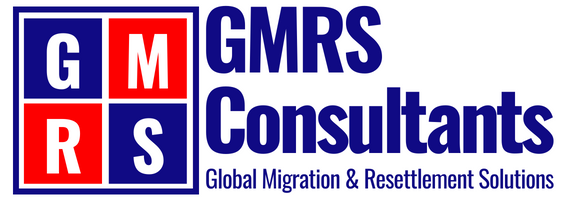
Canada Visitor Visa Consultant Services
A Canada visitor visa is a mandatory requirement when entering Canada for tourism puposes. This helps you move in and out of the country for six months. As a reputable Canadian immigration service provider, GMRS Consultants offers cost-effective and reliable services for getting a Tourist Visa to Canada. Our proficient immigration team handles all official procedures on your behalf, sparing you from the complexities of the single-entry or multi-entry visa application process.

Canada is a country that has lot to offer visitors from island to mountain waterfalls. Spreading from the Pacific coasts to the Atlantic, this vast beautiful country has a rich heritage from the North Coast of British Columbia to French explorers of Quebec. Tourist visa is an official document that is pasted in your passport. It shows that you meet the requirements needed to enter Canada. Most travelers need a visitor visa to visit Canada.

Basic Requirements
- Have valid Passport
- Have good health
- Have no criminal
- Have no immigration fraud
- Have enough money for your stay.
- Convince an immigration officer that will take you back to your home country.
- Convince an immigration officer that you will leave Canada at the end of your visit.
What are the eligibility criteria for a Canada Visitor Visa?
To obtain a tourist visa to Canada, certain basic requirements must be met:
- The person must possess a valid travel document, i.e., a passport.
- Candidates applying for a Canadian visitor visa could face medical inadmissibility if:1. Their medical condition is deemed likely to pose a risk to the health or safety of the broader Canadian population. 2. Their admission is anticipated to place an undue burden on Canada’s publicly funded healthcare and social services.
- A person with criminal or immigration-related convictions is not eligible to get a visitor visa to Canada; make sure you have a clear record.
- Demonstrate to an immigration officer that you have ties, such as employment, a residence, financial assets, or family, that ensure your return to your home country.
- Convince an immigration officer that you intend to depart Canada upon the conclusion of your visit.
- Have sufficient funds to support yourself during your stay. The required amount varies depending on the duration of your stay and whether you will be lodging in a hotel or with friends or relatives.
- Depending on the circumstances, you may also need to undergo a medical examination and obtain a letter of invitation from a Canadian resident.
Want to Schedule an Appointment?
Featured on

- What is a visa?
- Electronic Visa (eVisa)
- Visa on Arrival
- Appointment Required Visa
- Invitation Letter
- Arrival Card
- Passport Renewal
- Project Kosmos: Meet the man with the world's most challenging travel schedule
- Australia Visa and ETA Requirements for US Citizens Explained
- Brazil eVisa for US Citizens
- India Tourist Visa for UK Citizens
- Possible B1/B2 Visa Questions During the Interview
Select Your Language
- Nederlandse
- 中文 (Zhōngwén), 汉语, 漢語
Select Your Currency
- AED United Arab Emirates Dirham
- AFN Afghan Afghani
- ALL Albanian Lek
- AMD Armenian Dram
- ANG Netherlands Antillean Guilder
- AOA Angolan Kwanza
- ARS Argentine Peso
- AUD Australian Dollar
- AWG Aruban Florin
- AZN Azerbaijani Manat
- BAM Bosnia-Herzegovina Convertible Mark
- BBD Barbadian Dollar
- BDT Bangladeshi Taka
- BGN Bulgarian Lev
- BIF Burundian Franc
- BMD Bermudan Dollar
- BND Brunei Dollar
- BOB Bolivian Boliviano
- BRL Brazilian Real
- BSD Bahamian Dollar
- BWP Botswanan Pula
- BZD Belize Dollar
- CAD Canadian Dollar
- CDF Congolese Franc
- CHF Swiss Franc
- CLP Chilean Peso
- CNY Chinese Yuan
- COP Colombian Peso
- CRC Costa Rican Colón
- CVE Cape Verdean Escudo
- CZK Czech Republic Koruna
- DJF Djiboutian Franc
- DKK Danish Krone
- DOP Dominican Peso
- DZD Algerian Dinar
- EGP Egyptian Pound
- ETB Ethiopian Birr
- FJD Fijian Dollar
- FKP Falkland Islands Pound
- GBP British Pound Sterling
- GEL Georgian Lari
- GIP Gibraltar Pound
- GMD Gambian Dalasi
- GNF Guinean Franc
- GTQ Guatemalan Quetzal
- GYD Guyanaese Dollar
- HKD Hong Kong Dollar
- HNL Honduran Lempira
- HTG Haitian Gourde
- HUF Hungarian Forint
- IDR Indonesian Rupiah
- ILS Israeli New Sheqel
- INR Indian Rupee
- ISK Icelandic Króna
- JMD Jamaican Dollar
- JPY Japanese Yen
- KES Kenyan Shilling
- KGS Kyrgystani Som
- KHR Cambodian Riel
- KMF Comorian Franc
- KRW South Korean Won
- KYD Cayman Islands Dollar
- KZT Kazakhstani Tenge
- LAK Laotian Kip
- LBP Lebanese Pound
- LKR Sri Lankan Rupee
- LRD Liberian Dollar
- LSL Lesotho Loti
- MAD Moroccan Dirham
- MDL Moldovan Leu
- MGA Malagasy Ariary
- MKD Macedonian Denar
- MNT Mongolian Tugrik
- MOP Macanese Pataca
- MUR Mauritian Rupee
- MVR Maldivian Rufiyaa
- MWK Malawian Kwacha
- MXN Mexican Peso
- MYR Malaysian Ringgit
- MZN Mozambican Metical
- NAD Namibian Dollar
- NGN Nigerian Naira
- NIO Nicaraguan Córdoba
- NOK Norwegian Krone
- NPR Nepalese Rupee
- NZD New Zealand Dollar
- OMR Omani Rial
- PAB Panamanian Balboa
- PEN Peruvian Nuevo Sol
- PGK Papua New Guinean Kina
- PHP Philippine Peso
- PKR Pakistani Rupee
- PLN Polish Zloty
- PYG Paraguayan Guarani
- QAR Qatari Rial
- RON Romanian Leu
- RSD Serbian Dinar
- RUB Russian Ruble
- RWF Rwandan Franc
- SAR Saudi Riyal
- SBD Solomon Islands Dollar
- SCR Seychellois Rupee
- SEK Swedish Krona
- SGD Singapore Dollar
- SHP Saint Helena Pound
- SLL Sierra Leonean Leone
- SOS Somali Shilling
- SRD Surinamese Dollar
- SVC Salvadoran Colón
- SZL Swazi Lilangeni
- THB Thai Baht
- TJS Tajikistani Somoni
- TOP Tongan Pa anga
- TRY Turkish Lira
- TTD Trinidad and Tobago Dollar
- TWD New Taiwan Dollar
- TZS Tanzanian Shilling
- UAH Ukrainian Hryvnia
- UGX Ugandan Shilling
- USD United States Dollar
- UYU Uruguayan Peso
- UZS Uzbekistan Som
- VND Vietnamese Dong
- VUV Vanuatu Vatu
- WST Samoan Tala
- XAF CFA Franc BEAC
- XCD East Caribbean Dollar
- XOF CFA Franc BCEAO
- XPF CFP Franc
- YER Yemeni Rial
- ZAR South African Rand
- ZMW Zambian Kwacha
We've updated our app!
Download it now
Canada to Qatar: Visa requirements and how to get there
Canadian citizens do not need a tourist visa to travel to Qatar. As a Canadian you can stay for up to 30 days visa-free in Qatar.

Qatar visa requirements for Canadian Citizens
Ready to enter Qatar? Canadian Nationals can get a visa on arrival when entering Qatar , which allows for a stay of up to 30 days in Qatar.
If you need to travel to Qatar for a longer period, or for any reason other than tourism, we suggest you contact the Government of Canada for Qatar travel advice.
You can also check out our Qatar Travel page for visa and entry requirements information.
How to travel to Qatar from Canada
Whether you're considering non-stop flights or those with layovers in the Middle East, there's a wide selection available. Leading carriers such as Qatar Airways, Air Canada, and British Airways operate flights to Doha, the capital city. Remarkably, Doha's airport was ranked as the 50th busiest globally in 2016. For the best fares, it's advisable to book Qatar Airways flights well in advance.
Starting prices for basic economy tickets from Montreal Airport to Doha Airport begin at approximately 660 Canadian dollars. Expect to pay more if you're flying first or business class, or if you need additional baggage.
With an average flight duration of 12 to 13 hours, most airlines provide online check-in and a variety of entertainment options to make the journey more enjoyable. Although round-trip tickets may be pricier, they eliminate the need to book a separate return flight from Qatar to Canada, offering convenience and peace of mind.
Tips to remember when traveling to Qatar
Bear in mind that it's a lengthy journey, particularly if you choose flights with layovers. Selecting tickets with extended stopovers, which are often more affordable, might warrant joining a privilege club or exploring the unique benefits offered by specific airlines.
A valuable strategy is to compare different flights and their offerings. Take into account factors such as seat size (with some airlines offering wider seats for added comfort), flight departure times, the departure airport, baggage allowances, and policies on excess luggage before finalizing your flight bookings. This ensures you receive the best value and comfort for your investment.
It's wise to travel light and plan to shop in Qatar. Similar to Dubai, shopping is a significant attraction in Qatar, and you'll want to avoid excess baggage fees on your return. Beyond shopping, make plans and allocate a budget to visit the country's most famed attractions.
I need more information, who can I contact?
Feel free to reach out to our iVisa experts via chat , or WhatsApp .
Related Articles

Navigating Doha Hamad Airport: A complete guide to traveling through Qatar Airport

Qatar visa status: Track your application

Qatar eVisa for Nigerian citizens: Get your Qatar eVisa online now!
- iVisa is NOT affiliated with any government agency. This site does not provide legal advice and we are not a law firm. None of our customer service representatives are lawyers and they also do not provide legal advice. We are a private, internet-based travel and immigration consultancy provider dedicated to helping individuals travel around the world. You may apply by yourself directly on the various government websites. The source of information: https://visitqatar.com/intl-en/practical-info/visas
Cambridge, Ont., man expresses relief and frustration as family expected to arrive from Gaza
Many family members are still awaiting their visa from the canadian government.
Social Sharing
Several months after the federal government announced a new visa aimed at helping Palestinians in Gaza with familial ties to Canada, Rami Aljadba of Cambridge, Ont., is finally expecting the arrival of some family members to the region.
Aljadba said the process wasn't easy and some of his immediate family members fled Gaza in February without the help of the Canadian government, even though the visa program had launched a month earlier.
"We want stability for the family," he told CBC News. "We want to get them here, we want to get them into a more stable place where the kids can go on with their normal lives, with school, with health care, all these kind of things."
He explained it was a costly process paying an agency to get them out, and expressed frustration about the visa process and the government's inability to get his family across the Gaza border.
His sister and her family finally received their visas two months later, on April 7, while in Egypt, and Aljadba is expecting their arrival in Canada in a matter of weeks along with his father, who previously had a visa.
However, his brother and his family are currently in Belgium awaiting their visas, but have been given a unique code, which is part of the second phase of the three phase visa application process .
"The [Canadian government] might have some good intentions going into the program but it was handled in a very, very bad way," Aljadba said.
At a news conference in February, Minister of Immigration, Refugees and Citizenship Marc Miller acknowledged "people have actually been able to get through the border, I suspect, at great financial cost."
"It's very frustrating to me," Miller said about how the program had played out. "I don't want to put together a program that is failing but we are all failing Gazans at this point and I think that is something that we need to realize."
'We are all failing Gazans': Marc Miller
In an email statement in late February, Jeffrey MacDonald, a spokesperson with Immigration, Refugees and Citizenship Canada (IRCC), said "as of Feb. 26, 2024, 12 people who exited Gaza on their own and had [temporary resident visa] applications in process were able to submit biometrics and complete their application, and have been approved to come to Canada."
"Movement out of Gaza remains extremely challenging as countries and other actors set their own entry and exit requirements," MacDonald said as part of that statement.
CBC News reached out to IRCC for the most recent figures but didn't hear back by the time of publication.
Aljadba explained his sister-in-law and family also managed to escape on their own from Gaza to Egypt in early March and have received a code, but are awaiting a visa.
His wife's parents and his two brother-in-laws are still in Gaza with their codes too, but Aljadba's family is debating on how to get them out.
"Do we wait for our luck to see if [the Canadian government] can get them out or do we have to pay out of pocket again to get them out?" said Aljadba. "That's the situation."
- Cambridge man hopes new chance for visas will help bring family in Gaza to Canada
- Canadian survivor of Oct. 7 music festival attack recounts experience 6 months later
April marks the six-month anniversary of the Israel-Hamas war, which was sparked by a deadly civilian attack in Israel carried out by Hamas on Oct. 7.
Media have reported more than 1,200 Israelis were killed that day and 253 taken into Hamas-controlled Gaza, according to Israeli tallies. Approximately 130 remain captives of Hamas.
More than 33,000 Palestinians have been killed in retaliatory attacks, many are children and women , and more than 80 per cent of Palestinians in Gaza have been displaced by the conflict.
Hungry in the north
Aljadba said he feels "more content" now that some family members are out of Gaza and he isn't "worried about calling in the morning and checking names to see if anybody was killed or injured or if anyone was bombed," but his wife's parents and siblings are still in the middle of Gaza. He has extended family in the north too.
Those in the north are in a part of the territory which is on the brink of famine , and Aljadba said some there had resorted to eating animal feed, but even that has run out.
"The whole thing is still going on," Aljadba said. "And it comes with its whole mixed bag of anger and sadness and hopelessness, kind of emotions."
Aljadba said his family has had some luck with getting food from the air drops, but not so much from the trucks delivering aid. But going out to get the food comes with its own dangers. He said that one cousin broke his leg scavenging for food, and a second cousin was killed by gunfire.
He said family in the middle of the territory have had a much easier time accessing food than those in the north, but food costs are high there.
"We send money from here," Aljadba said. "Things are very, very expensive. A hundred dollars doesn't go far.
"Like for example … you'd buy one egg for three dollars. It's just insane."
ABOUT THE AUTHOR
Reporter/Editor
James Chaarani is a reporter/editor for CBC Kitchener-Waterloo. You can reach him at [email protected].
With files from Raffy Boudjikanian, Brennan MacDonald, Thomson Reuters

IMAGES
VIDEO
COMMENTS
To apply for a visitor visa to visit Canada on business, you need to qualify as a business visitor. To qualify, you must show that: you plan to stay for less than 6 months. you don't plan to enter the Canadian labour market. your main place of business and source of income and profits is outside Canada.
If you are a resident of Qatar and want to apply for a visa to Canada, you can visit the VFS Global website to find out how to submit your application at the Canada Visa Application Centre in Doha. You can also check the status of your application, book an appointment, and access other useful information and services.
You need a visitor visa to travel to Canada. A visitor visa: is a sticker we put in your passport; costs CAN$100; Processing times vary by country. You may need to give your fingerprints and photo (biometrics) Opens in a new tab with your application. Processing time doesn't include the time you need to give biometrics.
Lawful permanent residents of the U.S. As of April 26, 2022, lawful permanent residents of the United States must show these documents for all methods of travel to Canada: a valid passport from their country of nationality (or an equivalent acceptable travel document) and. a valid green card (or equivalent valid proof of status in the United ...
In order to effectively apply for a Canada visit visa from Qatar, qualified candidates must submit the following documents: A valid passport for travel or other travel document. Two recent passport photographs. An application fee. A invitation letters from a friend or relative in Canada, if applicable.
5. You travel to Canada (if you're approved) Make sure you travel with the documents we gave you. This includes travel documents like a visitor visa, study or work permits or an eTA (electronically linked to your passport). Airline staff and border service officers at ports of entry will ask to see your travel documents.
Who can get a visa. You must meet some basic requirements to get a visitor visa. You must: have a valid travel document, like a passport. be in good health. have no criminal or immigration-related convictions. convince an immigration officer that you have ties—such as a job, home, financial assets or family—that will take you back to your ...
Step 2: Apply online. 1. Create an account. 2. Upload your documents. 3. Pay your fees. How to apply for a visitor visa.
Family members must complete their own application forms. However, you may submit your applications together online or at a Visa Application Centre (VAC) and use one payment receipt for the total amount. Your spouse or common-law partner and children must meet all of the requirements for temporary residence in Canada.
The cost of a Canada visit visa from Qatar will depend on the type of visa you are applying for and the processing time. The fee for a visitor visa is CAD 100, while the fee for an eTA is CAD . You may also need to pay additional fees for biometrics and other services.
Cash limit. Any amount up to CAD$10,000 (or foreign equivalent) can be freely imported or exported. Travellers must report anything over this amount to the Canada Border Services Agency (CBSA) when they arrive or leave. For further information on this recommendation, please visit the CBSA Travelling with CAN$10,000 or more.
Step 5: Start Your Canada Visa Application. Once all your paperwork is in order you can now start the process of applying for your Canada visa. Be sure to fill in each section completely and correctly as any mistake could result in your application being returned and ultimately delaying the entire process.
Travel advice and advisories - Qatar. Exercise normal security precautions. Travel advice, passport and entry requirements, health and safety information, and more. ... Get a visa to study, work or visit Canada. Travelling outside of Canada. Travel advice for how to stay safe and returning to Canada. Living abroad. Everything you need to know ...
Embassy of Canada to Qatar, in Doha. We provide services to Canadians visiting and living in Qatar. ... Get a visa to study, work or visit Canada. Voting abroad. Voting process for Canadians who live abroad. Office information ... Visa and immigration services. Website: IRCC web form Book an appointment ...
Qatar. Qatari citizens must obtain a visa before travelling to Canada. Canada Visitor visa is required for Qatari citizens. With this tourist visa stay is usually short with a period of 180 days and visa expires in 180 days. Applicant is required to be present when applying for Canada tourist visa. A total of 10 documents are required for ...
Steps to Apply for a Tourist Visa. To successfully apply for a tourist visa, follow these steps". Step 1. Prepare the required documents. For a complete list of necessary documents, you can refer to the official Canada.ca website. Step 2. Apply online. Begin by creating an account on the IRCC portal. You can access the portal through the same ...
Visa-free entry or Hayya e-visa. Qatar is one of the world's most welcoming countries for visitors. Chances are that you probably don't need a visa. Nationalities from 102 countries can enter visa-free, and all others can apply for an e-visa using the Hayya platform online.
Qatari Citizens wishing to travel to Canda. Holders of diplomatic, special or regular passports are required to apply for a visit visa, which must be issued at the Visa and Immigration Section of the Embassy of Canada in Abu Dhabi www.uae.gc.ca before departure.. Citizens of Canada wishing to travel to Qatar
Recent changes to visitor visa requirements for some Mexican nationals may leave some foreign nationals looking to visit Canada with questions about their own situation. To assist, CIC News has compiled a list of frequently asked questions that may be helpful to review before expending the time, energy and money necessary to come to Canada.
The Qatar tourist visa is available to nationals of all countries, except GCC citizens, but citizens of over 101 countries are eligible for a free visa on arrival (see Visa-free entry above). Travellers of select nationalities will require to pay a fee to obtain a visa on arrival or apply for a tourist visa prior to travel.
Foreign Representatives in Canada; Canadian passports; Visas. Tourist visa: not required Business visa: not required Student visa: required Work permit: required Residence permit: required. ... It does not apply between Canada and Qatar. If your child was wrongfully taken to, or is being held in Qatar by an abducting parent: ...
A Canada visitor visa is a mandatory requirement when entering Canada for tourism puposes. This helps you move in and out of the country for six months. As a reputable Canadian immigration service provider, GMRS Consultants offers cost-effective and reliable services for getting a Tourist Visa to Canada. Our proficient immigration team handles ...
Canadian citizens do not need a tourist visa to travel to Qatar. As a Canadian you can stay for up to 30 days visa-free in Qatar. Qatar visa requirements for Canadian Citizens. ... How to travel to Qatar from Canada. Whether you're considering non-stop flights or those with layovers in the Middle East, there's a wide selection available. ...
Hayya Platform Visas. Hayya" is the e-platform that streamlines the tourist visa application process for those from around the world who want to visit the State of Qatar. The Hayya platform offers four types of entry permits: Tourist Visa. Entry visa for residents of the Gulf Cooperation Council (GCC) countries.
Several months after the federal government announced a new visa aimed at helping Palestinians in Gaza with familial ties to Canada, Rami Aljadba of Cambridge, Ont. is finally expecting the ...